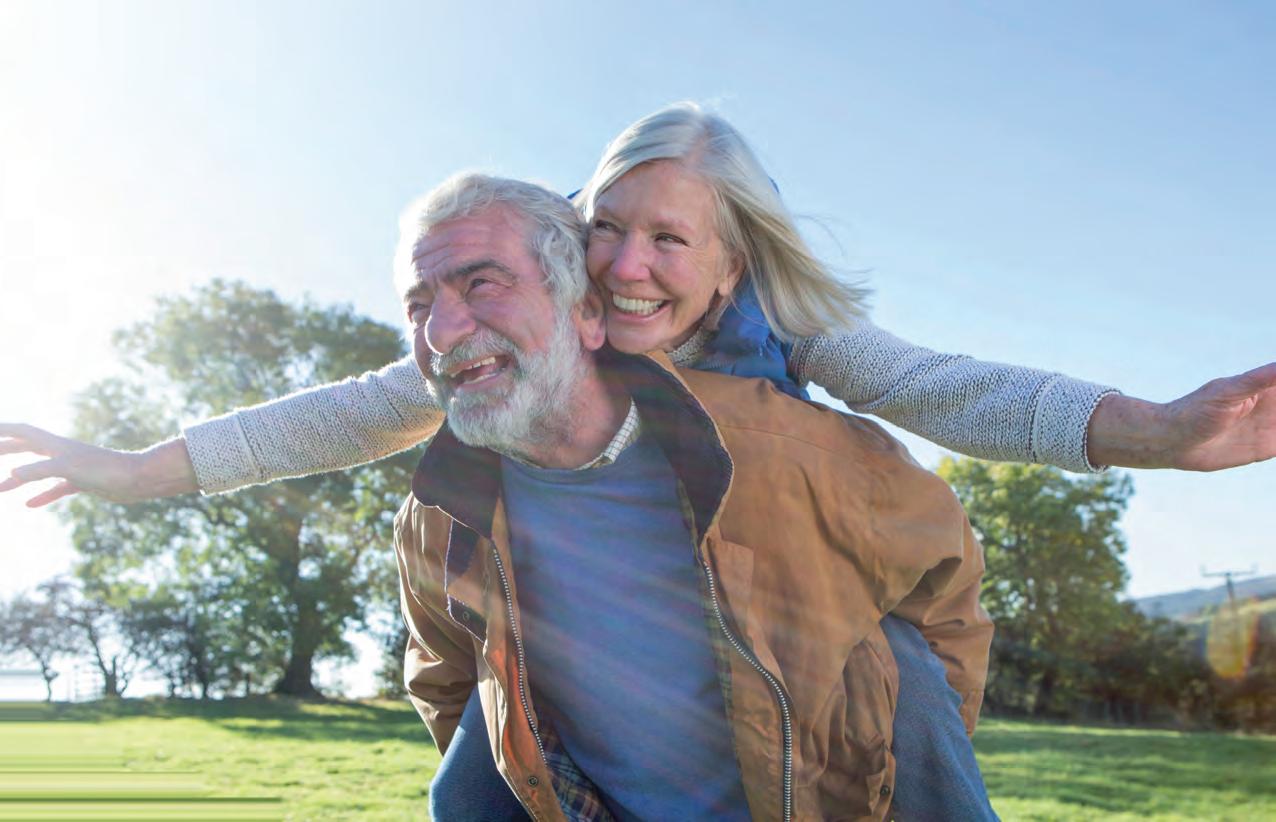






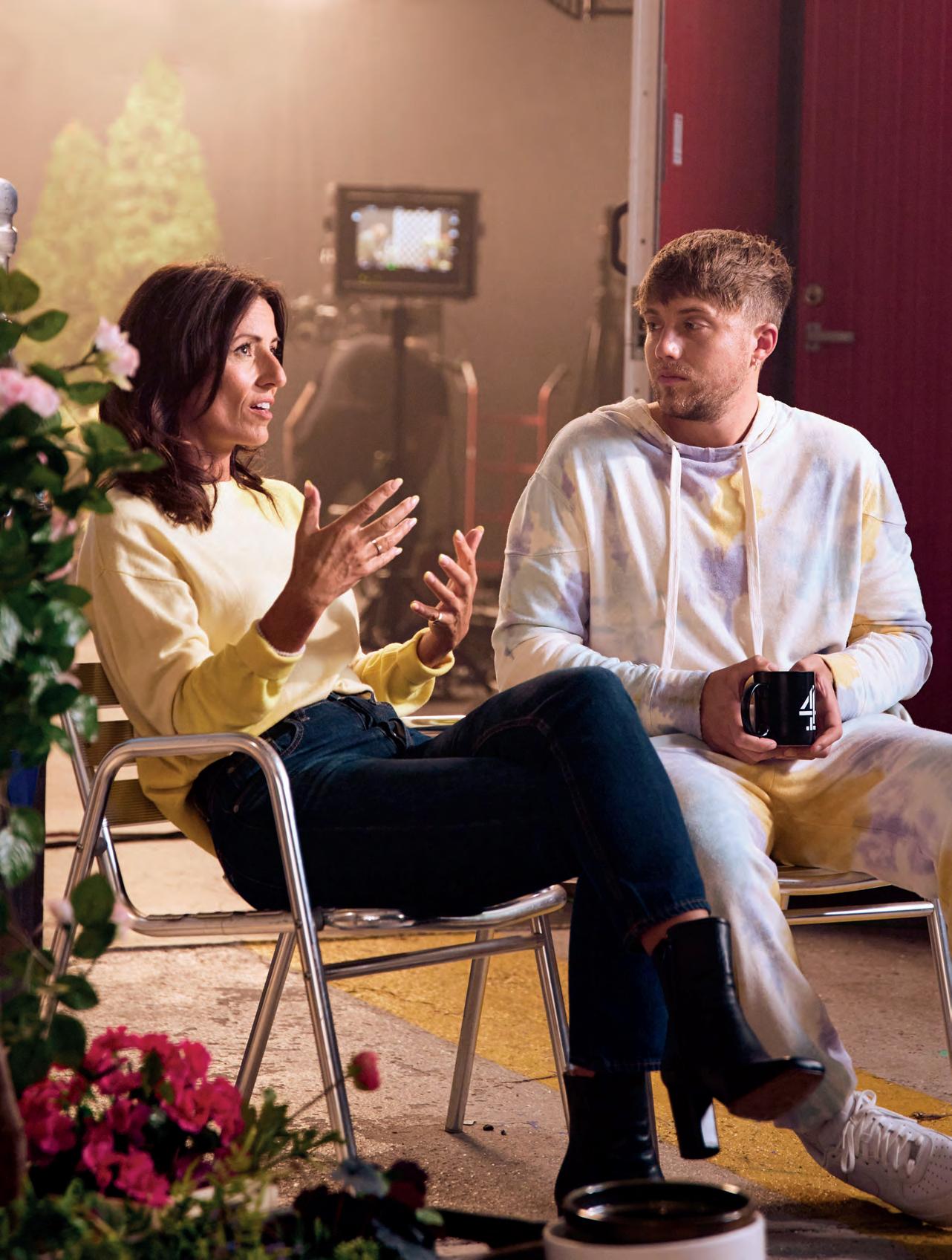













02 Latest news
Our Cancer Support Service; free online talks 04 Feel better in 2023

Coping with incontinence, varicose veins and back pain 06 Member story
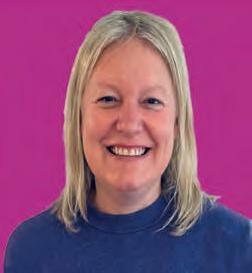
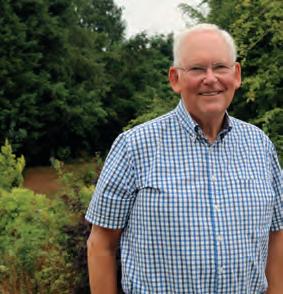
Life after prostate surgery 08 A helping hand
Our Care Planning and Social Care Advice Service 09 How to spot endometriosis Symptoms and treatments 10 Mental Health Helpline Support for young people 11 Try me Reduce your alcohol intake 37 Access our services
How to get in touch with us 39 Your say
Feedback on past issues
TV personalities join Benenden Health and Channel 4 to remind the nation to check in on their mental and physical wellbeing
Your guide to a good night’s sleep 31Power

Your cut-out-andkeep guide to assessing your health and wellbeing
Good sleep is vital for a healthy body and mind. Here’s how to get some settled slumber
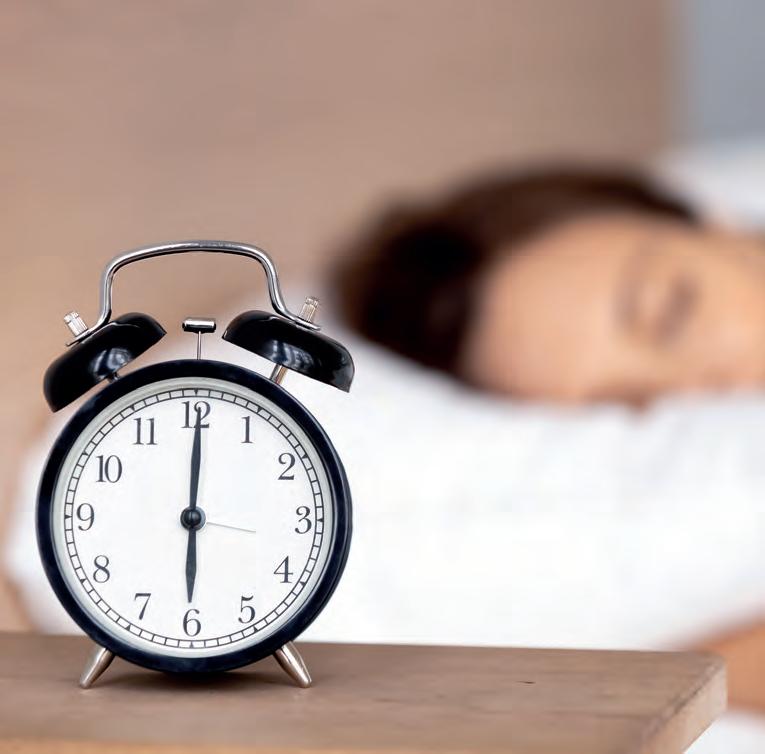
Breaking the stigma barrier
With burnout and stress on the rise, what can organisations do to improve mental wellbeing at work?
Fuel Bank Foundation is a charity that works to address fuel poverty, currently hitting many families
To CBD or not to CBD?
Max Pemberton on the pros and cons of CBD
With 2023 already well under way, it’s always a good idea to take a closer look at your health. To help, we’ve put together a ‘health MOT’ checklist – see page 19 for more details. Continuing the theme, our partnership with Channel 4, ‘Time for a check-in’, highlights the importance of keeping an eye on your health. We talk to the campaign’s stars, including Davina McCall, Roman Kemp, Judi Love and Alex Brooker, about how they take care of their physical and mental health. Finally, on page 24 we look at some common conditions that can affect our sleep and offer useful tips on getting a better night’s rest.
Our Cancer Support Service offers help with the practical and emotional challenges of cancer
Acancer diagnosis is life-changing. It affects the person who’s been diagnosed and their family and friends too. Having the right support to manage the practical and emotional challenges of cancer can alleviate having to lean on loved ones.
Benenden Health’s new Cancer Support Service* helps our members who are dealing with cancer. It offers support after diagnosis, throughout treatment and when readjusting to life after cancer.
Member Denis Wright talks
about his experience of using the service and the invaluable support offered by his dedicated nurse, Laura.
“After I decided to call the new Cancer Support Service, I can honestly say it was a roaring success from the word go. I spoke to a lovely nurse, Laura, who really took the time to listen to me. We had a long chat about my illness and treatment.
“I love going out with my wife for walks, but it was becoming increasingly difficult.
“Laura suggested I visit a local disability and mobility shop for advice on the most appropriate, ultra-lightweight, foldable wheelchair so my wife would be able to take me out
for walks. I gave Laura the details of the suggested wheelchair and this was ordered and delivered to my home within a couple of days with no fuss and at no cost to me.
“The support from Laura was excellent. I felt she genuinely cared. She would call me to see how I was and how I was managing with the symptoms of my treatment. Her calls really cheered me up.
“I am really delighted with the service and I am sure it will be very helpful to other Benenden Health members during difficult times.”
A specialist nurse can advise you on how to talk to your family about a cancer diagnosis
As well as identifying, arranging and paying for services to help members with issues relating to their condition**, some of the other types of support offered include:
l Advice on how to talk to your family about your diagnosis
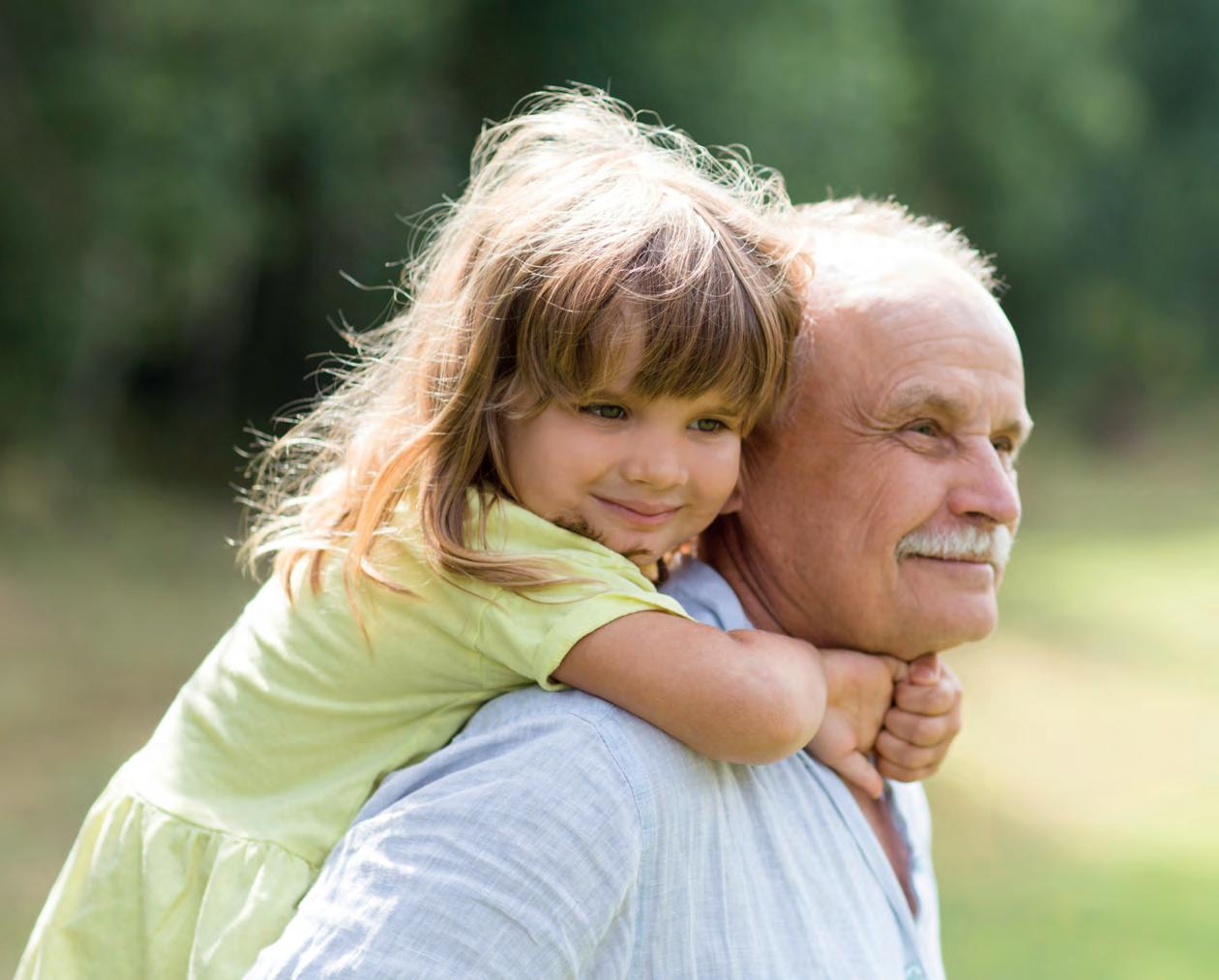
l Coping strategies and relaxation techniques to help manage anxiety
l Helping to prepare questions ahead of consultations
l Preparing for and support with return to work.
* AVAILABLE AFTER
**
Automated external defibrillators donated in successful campaign
Community groups up and down the UK have been the recipients of automated external defibrillators (AED) thanks to a recent campaign by Benenden Charitable Trust with the support of Benenden Health.
There was a great response to the initiative from members. An expert panel of clinicians and representatives from Benenden Charitable Trust and Benenden Health reviewed the applications. In total, 82 AEDs have been donated together with 41 outside cabinets to house the equipment.
One organisation which has received a new AED is The Crescent Community Venue in York. A former Working Men’s Club, the venue is now a
In total, 82 AEDs have been donated around the UK
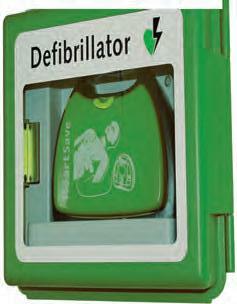
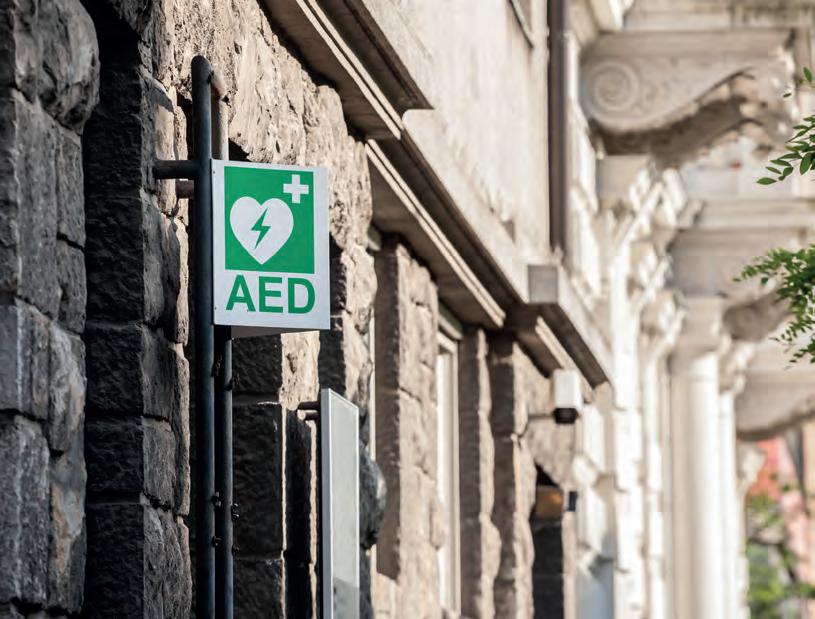
popular musical and cultural hub for the local community.
Owner Bob Leyland says: “We applied as a measure to improve facilities in the area as the nearest AED is
some distance away. An AED in this location will improve the safety of the many people who frequent the venue and the local area.”
Aseries of free online talks about self-pay treatments at Benenden Hospital will take place this spring. Benenden Hospital’s consultants and medical experts will discuss the stages of each self-pay treatment and answer your questions live.
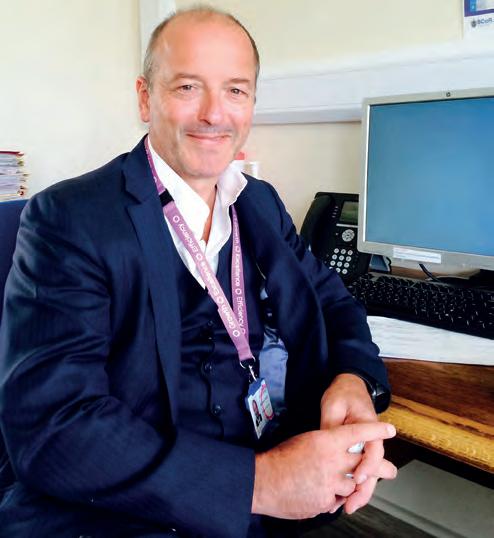
Exclusive attendee discounts are available*.
Topics include:
l Hip and knee surgery
l Cosmetic surgery
l Cataract surgery and special lenses
l Varicose vein treatment
l Gynaecology treatments and surgery.

* Discounts are subject to the terms and conditions advertised at each event and are exclusive to registrants of each event
Visit benendenhospital. org.uk/webinar-booking to book your place today. If you’re not able to make it on the day, recordings of previous talks are available
Niggling health problems can really get you down over time. Benenden Hospital experts offer advice on managing three common issues as well as options for self-pay treatments
COMPILED BY CAROLINE ROBERTSOmar Mohamed, consultant orthopaedic spinal surgeon at Benenden Hospital
Back pain is very common, and non-specific low back pain with no significant cause accounts for most cases. The pain can originate from muscles, ligaments and tendons, or spinal joints. Causes include injury, prolonged sitting, obesity, general wear and tear, and osteoarthritis.
Self-pay options at Benenden Hospital include facet joint denervation, a procedure that treats pain originating in the small joints that link the vertebrae and involves using high temperatures to destroy the nerve endings that transmit the pain.
Occasionally, surgery on a self-pay basis may be needed for a slipped disc or to widen
a narrowing spinal canal and relieve pressure on the nerves.
l Keep moving as rest doesn’t benefit back pain. If you must sit for long periods, get up and move around regularly.
l Get plenty of exercise. Activities such as swimming, yoga and Pilates help strengthen the core muscles that support the spine.
l Lose surplus weight to reduce strain on your spine.
Varicose veins are caused by the failure of valves that help blood flow back to the heart. This means blood pools in the leg veins causing them to become swollen, lumpy and dark blue or purple. Varicose veins range from clusters of tiny thread veins, a cosmetic issue, to large veins that cause aching, heaviness and even lower leg ulcers that are difficult to heal.
Benenden Hospital is the UK’s biggest provider of private
varicose vein treatment and has extensive experience in minimally invasive surgery. Minor varicose veins can be treated with sclerotherapy, which involves injecting a solution into the veins to seal them whereas larger veins that cause swelling and aching are considered a medical issue.
Ultrasound imaging is used to locate the leak and, under local anaesthetic, a laser is inserted through a tiny incision to seal the problem veins. This
relieves the symptoms and usually achieves a good cosmetic result. However, around 10% of patients opt to treat remaining small veins with sclerotherapy on a self-pay basis.
There are a few things you can do to relieve the symptoms of varicose veins:
l Maintaining a healthy weight can help take the strain off your legs.
l Knee-high compression stockings support blood flow but it’s important to get them fitted by a specialist retailer.
l Elevating your legs can reduce aching and swelling.
Jan Chaseley, clinical nurse specialist continence care at Benenden Hospital
Urine leakage is estimated to affect up to 20% of us. There are two main types of urinary incontinence: an overactive bladder causes frequent urination and urgency, while weak pelvic floor muscles can lead to stress incontinence, or leaks when you cough, sneeze or exercise. Stress incontinence often affects women after childbirth or menopause, but can affect men, for example after prostate surgery.
medical advice if there’s no improvement after two or three months.
l Exercise your pelvic floor. Contract and relax the muscles up to 10 times, three times daily. Visit our Continence Care Service at Benenden Hospital to learn the right technique.
l
For information on self-pay treatments at Benenden Hospital, call 01580 242521
Treatment options, including self-pay procedures available at Benenden Hospital, may involve bladder retraining, medication or Botox injections to calm an overactive bladder. A non-mesh sling is sometimes inserted to support the urethra and helps to stop leaks in stress incontinence.
l Avoid bladder irritants like caffeine, alcohol and smoking. Drink enough water as concentrated urine worsens irritation and urgency.
l Hold on for a bit longer to retrain your bladder. Going as soon as you feel the urge reduces its capacity over time.
Could it be your prostate?
l
To find out more about whether your Benenden Health membership can support you with any of these health issues, visit benenden.co.uk/guide
Self-management tips: Try these solutions but seek
Prostate enlargement is common in men over 50. If you need to pee more often at night or the flow is getting slower, talk to your doctor. See page 6 for more.
Benenden Health member Nigel Batt’s wellbeing was being affected by benign prostate enlargement. The solution? TURP, a minimally invasive surgical procedure
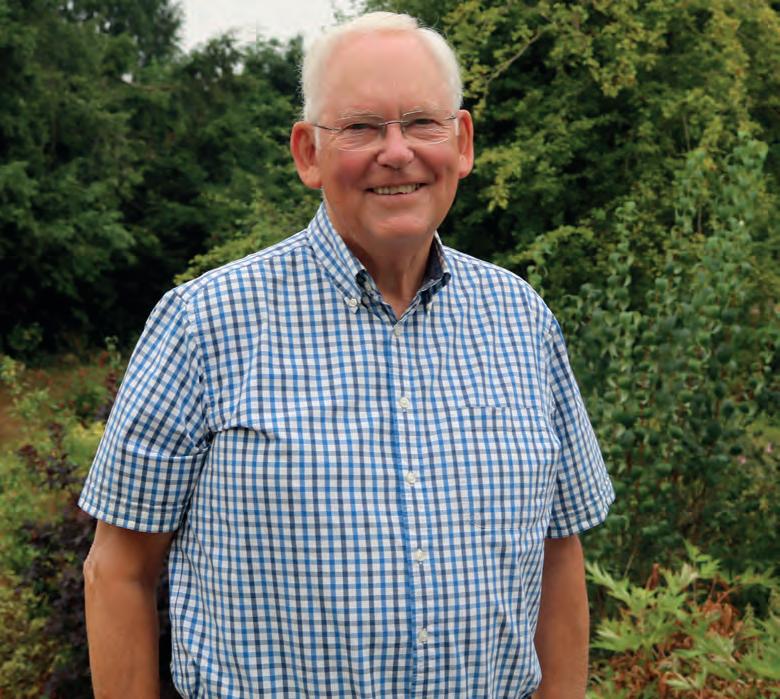
In common with many men of his age, Nigel Batt started experiencing the effects of benign prostate enlargement in his early 60s. “I was needing to urinate more frequently and my bladder wasn’t emptying properly,” says the 76-year-old retired chartered accountant who lives in Sevenoaks, Kent, with his wife, June. “I did see my GP, but surgery seemed the only option and I wasn’t keen on that back then. So, I just got on with things, and my symptoms slowly grew worse.”
The prostate is a walnutsized gland which produces fluid for semen. It surrounds the urethra, a tube which carries urine from the body. With age it is natural for the prostate to grow, restricting urine flow. Prostate enlargement affects more than half of men over 60 years old and 90% of men over 80.
Not associated with cancer, and posing no risk to physical health, benign prostate enlargement can adversely affect wellbeing. “Eventually I was waking up four or five times a night to go the bathroom, often urgently, and when I got there nothing would happen,” says Nigel. “It was very frustrating and tiring, and although my annual prostate cancer tests
always came back negative, I was still afraid of that.”
A conversation with two close friends finally persuaded Nigel to rethink surgery. Like him, each had suffered moderate to severe symptoms of prostate enlargement, but both had positive experiences of having transurethral resection of the prostate (TURP), a minimally invasive surgical procedure that resolved their problems.
After consulting his GP and discovering there were long wait times in urology, Nigel contacted Benenden Health, and was pleased to find out this procedure was covered by his membership. He met consultant surgeon at Benenden Hospital Mr Steve Garnett, who explained the TURP procedure in detail: carried out under anaesthetic, it involves passing a microscopic instrument along the urethra to reduce the size of the enlarged gland, which eases pressure and thereby improves urine flow. Nigel’s TURP procedure took place in August last year.
Talk to your GP if you need a referral for a TURP procedure. For further information on how we could support you under your membership, call 0800 414 8100
Describing his post-TURP life as ‘amazing’, Nigel wishes he had acted sooner. “I did put it off for a very long time, and worried about it a lot,” he says. “I would urge anyone else experiencing the symptoms of prostate enlargement not to delay seeking help. My wellbeing is now excellent, and it’s great to get back to what I call normal.”
These days that means regular spin-cycling sessions, swimming, playing tennis, and sleeping soundly.
‘My wellbeing is now excellent, and it’s great to get back to normal’
Nigel Batt: “I did put it off for a very long time”

During the colder months, our attention inevitably turns towards how to protect ourselves from bacterial and viral infections.
When it is healthy, your immune system can protect you from getting common colds and flu. It can also protect you from developing chronic illnesses such as type 2 diabetes, and cardiovascular, neurodegenerative and autoimmune diseases.
..
Nutrition and habits that will help keep your immune system functioning well
The gut plays a complex and fundamental role in the body’s immune system. To keep it healthy:
l Eat a whole food diet featuring plenty of colourful vegetables

l Include prebiotic foods (which feed the healthy gut bacteria) in your diet, such as soluble fibres, onions, garlic, artichoke, asparagus and banana
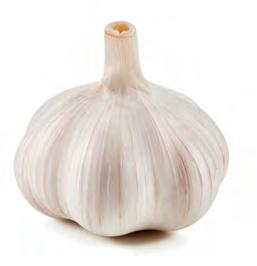
l Include probiotic foods (live bacteria) in your diet, such as live yoghurts, and fermented foods (for example, sauerkraut)
l Buy organic when you can
l Manage stress levels
Whizz up the following ingredients for an immunityboosting smoothie packed with antioxidants
l 1 cup milk of choice
l handful frozen blueberries and raspberries
l small handful spinach

l 1 tsp almond butter
l 1 pitted date

Antioxidants quench or neutralise free radicals, too many of which can overwhelm the body’s need for and capacity to neutralise them, resulting in cellular damage, inflammation and chronic disease. A diet rich in plant foods will provide lots of antioxidant nutrients – such as vitamins C and E, and beta-carotene – and help boost the strength of your immune system.
Vitamin C supports the immune system, prevents infections and wards off the common cold. Make sure to include high vitamin C foods in your diet such as bell peppers, thyme, parsley,

spinach, kale, broccoli, kiwi and citrus fruits.




This mineral is critical for healthy cell development and function. It improves wound healing, thyroid function, gut health, blood clotting, vision and smell. Zinc also works as a powerful antioxidant – when you are deficient in zinc the function of your T cells, which act as soldiers for your immune system, is reduced.
Vitamin D deficiency is linked to higher
rates of cancer, multiple sclerosis, osteoporosis and many other conditions. An optimal vitamin D level is 1,000-2,000IU per day for adults, and 400-1,000IU per day for children.

Your body repairs and renews its cells while you are sleeping. A full night’s sleep helps your body to develop a better antibody response against airborne viruses such as colds.
Abir Hamza-Goodacre is a BANT-registered nutritional therapist. For information on how Benenden Hospital can help with nutrition services on a self-pay basis, contact the Private Patients team by email on privatepatients@ benenden.org.uk or call 01580 232499.

If you or your child have special needs and require support and advice, call 0800 414 8100 for information on our Care Planning and Social Care Advice Service
Benenden Health member Sarah* has always known that her 12-year-old daughter needed additional support. Alicia* has sensory issues, finds it difficult to regulate her emotions and is very rigid in her thoughts. If Alicia needs to do anything outside her usual routine, Sarah has to resort to bribes and counting her down. Most recently, Alicia appears to have developed tics and is having tests to rule out underlying medical conditions.
Alicia’s school suggested assessment for autism spectrum condition (ASC) and is looking at strategies to help. However, despite various parenting courses and having been bounced between the GP and school, Sarah has been left feeling lost and unsupported.

Benenden Health’s Care Planning and Social Care Advice Service supports parents just like Sarah who are caring for a child with special educational needs and disabilities (SEND).
From day one of your membership, you can request a telephone consultation with a specialist care planning adviser who will listen and discuss your situation in detail. They will help you make the right choices
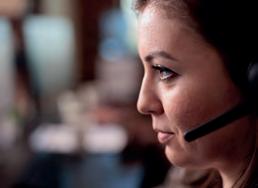
by signposting support strategies, funding and care options. Conditions supported include ADHD, autism, Down’s syndrome, cerebral palsy and learning disabilities.
During her initial consultation with Frankie, her special needs adviser, Sarah explained her situation and talked about how nothing was totally clear cut. Empathising with the situation, Frankie talked Sarah through the SEND process – how it works, what is involved and the steps to take. She also answered questions about the Education, Health and Care Plan and funding for additional support.
Frankie then carried out bespoke research into Alicia’s situation, had a feedback consultation with Sarah and wrote to her summarising their agreed action plan. Sarah was also sent more in-depth information on ASC, ADHD, OCD, Tourette’s syndrome and tics, as well as suggested strategies for self-regulation.
Frankie followed up with telephone calls to check in with Sarah and to make sure she knew that she could contact her if she needed any further information or advice.
Thanks to the support made available to her, Sarah now feels much more positive and that she has a “pathway lined up”. Most of all, she is relieved that she finally has someone there to concentrate on supporting her and Alicia.
If
‘Thanks to the support, Sarah now feels much more positive’
Consultant gynaecologist at Benenden Hospital Mr Rowan Connell outlines the symptoms and treatment options for this hard-to-diagnose condition
BY CAROLINE ROBERTSEndometriosis is a long-term condition in which cells similar to those of the womb lining are found in other parts of the body – most commonly the pelvis.

Affected by the hormones that drive the menstrual cycle, this tissue breaks down and bleeds monthly. The trapped blood can then cause pain, inflammation and scar tissue.
It’s estimated that around one in ten women of fertile age are affected to some extent, but endometriosis can sometimes take years to be diagnosed because symptoms often mimic those of other common conditions.
Pain often starts as a dull ache in the lead-up to a period and worsens when bleeding begins. If there’s endometriosis on an ovary, you may have mid-cycle pain on one side, and perhaps down your leg, when an egg is released. You may also have pain during and after intercourse due to it pulling on internal adhesions caused by the scar tissue.
Endometriosis can cause long and heavy periods, and sometimes bleeding between periods.
Endometrial tissue is sometimes found on the rectum and bladder and this can cause painful bowel movements or urination, and occasionally bleeding. The inflammation can also lead to spasms in the digestive tract and diarrhoea, which may be mistaken for Irritable Bowel Syndrome.
Endometriosis can cause tiredness, lethargy and low mood. This is partly due to the unpleasant symptoms but also because the inflammation prompts your immune system to work overtime.
Although it doesn’t usually block the fallopian tubes, endometrial tissue around the reproductive organs can make it harder for sperm to reach the egg.
Endometriosis is diagnosed by laparoscopy, a keyhole operation in which the surgeon uses a small camera to look inside your abdomen. This is done
under general anaesthetic and you can usually go home on the same day. In many cases, your surgeon can remove a significant amount of the endometriosis during the procedure, which will relieve symptoms.
There’s no cure for endometriosis, although many women find symptoms lessen or disappear after the menopause when hormone levels fall. If you’re not planning a pregnancy, you can have a Mirena hormone-releasing coil implanted to thin the womb lining and control symptoms. For women who have completed their families and are approaching the menopause, a hysterectomy and removal of the ovaries followed by hormone replacement therapy may be an alternative option.
To find out more about whether your Benenden Health membership can support you with endometriosis, visit benenden.co.uk/ guide
If you or your child are experiencing low mood and/or anxiety or depression, call our 24/7 Mental Health Helpline on 0800 414 8247 to book an appointment
Our 24/7 Mental Health Helpline offers short-term support for 11 to 15 year olds*


For parents of children experiencing mental health struggles, support can often feel difficult to access. Waiting times have increased as the effects of the Covid-19 pandemic have put even more pressure on mental health services for children and young people.
However, if your child is aged 11 to 15 and is a Benenden Health member, support may be available. Aimed at those who are experiencing difficulties and challenges with low mood and/or anxiety, the parent or guardian can call the 24/7 Mental Health Helpline to arrange an appointment with a specialised children and young people (CYP) clinician. An
initial clinical assessment or ‘triage’ will be offered within 48 hours of the initial call.
This assessment, first with the parents, then with the child, allows the clinician to understand the wider context of what’s going on.
As Karenza Cross, clinical supervisor at Vita Health Group, which provides the service on behalf of Benenden Health, says: “This opens up a channel where the child or young person feels safe.”
She cites post-Covid social anxiety as a big issue affecting young people as they readjust to being back in school. Warning signs for parents to watch out
for include not wanting to attend school or isolating from friends. Other common issues are low feelings, sleep problems, bullying and family and friendship difficulties.
Karenza explains: “We get to know the child’s interests and identify what self-care approaches they could adopt. Depending on the support they need, we either send relevant information and materials, or recommend further intervention such as counselling or low intensity cognitive behavioural therapy*. This involves six sessions of 50 minutes, conducted remotely either at
home or at school. This can also include guided self-help where a specialist uses strategies such as breathing techniques.”
Cheryl Woon, clinical lead, CYP, at Vita, explains: “As we get to know the child, we can adapt our approach. Some children may find talking difficult, so we’ll use play therapies such as Lego or a board game. This works well even virtually.” If further intervention is required, or if the case is assessed as more serious, the clinicians at Vita will help signpost parents to access more support from their GP or NHS agencies such as CAMHS.
Anew year always brings a flurry of resolutions to lead a healthier lifestyle. Around 130,000 people tried the Dry January challenge in 2021, and many reported that they felt healthier at the end of it.

Sustained consumption of alcohol can lead to higher risk factors for cancer, heart disease, liver disease and strokes. It can also cause accidents, alcohol poisoning and sleep problems, among other issues.
While the UK’s chief medical officers stated in 2016 that no level of regular drinking is considered completely safe in relation to some cancers, reducing alcohol intake is always a good resolution.
The NHS recommends that to keep the health risks low, you should drink no more than 14 units per week, spread across at least three days.
There are some online calculators that help to convert drinks into units, but a general rule of thumb is a can of lager, beer or cider is 2.7 units, a standard glass of wine is 2.1 units, and a shot of spirits is between 1.0 and 1.4 units.
Whether it’s hitting the gym, trying to eat more plant-based foods or drinking less alcohol, use the motivation of a new year to power the changes you want to make to your lifestyle.
If you don’t want to cut out all alcohol, restrict your drinking to certain days of the week or only at the weekend.
Tell friends and family what you’re doing so that they can encourage you and rearrange plans to make it easier for you to avoid alcohol when spending time with them.
Alcohol-free or lowalcohol alternatives to beer, wine and spirits are becoming more popular and have improved in quality and taste. Between 2016 and 2021, total sales nearly doubled in the UK.
Benenden Health’s partnership with Channel 4 features some well-known TV faces.
Be Healthy asked them about their approach to checking in on their health
If you’ve been watching your favourite TV programme on Channel 4 over the past few months, you will probably have noticed a series of Benenden Health adverts featuring some TV personalities talking about different aspects of health.
This is part of our ongoing partnership with Channel 4 to encourage the nation to check in on the wellbeing of themselves and their loved ones. It’s all about starting a conversation around your current health concerns, so that instead of ignoring any symptoms, you get them checked out by a GP or health professional.
Be Healthy caught up with the celebrities to find out more about how they look after their physical and mental health.



‘Exercise is the last thing I want to do but the first thing I know will work. Nothing changes my mood quicker’


Be Healthy: In what ways do you check in on your mental health?
Davina McCall: Apart from when the perimenopause side-swiped me, my mental health has been pretty good. If I’m not quite clocking that I’m tired or stressed – which is probably the way my mental health affects me the most – I’m lucky that I have a partner who sees small changes in me. If I’m not taking the necessary steps to take care of myself, he will notice and then I will think about what I need to do.
Roman Kemp: Noticing when you might be feeling anxious, tired and run-down is really important. Taking time out for myself is key – relaxing at home, going for a run or playing football with my mates. Never ignore the signs when you’re feeling burnt out and take the time to see how you can slow down or switch off to make yourself feel better.
BH: With your busy schedules, what’s the most important thing you try to focus on to look after your mental health?
DM: The first thing I turn to is exercise. It’s the last thing I want to do but the first thing I know will work. Nothing changes my mood quicker than exercise – and it will physically tire me out which means I sleep better.
RK: Spending time with my friends and the people I care about. I play football with my mates once a week and it’s the best thing. Not only are we catching up, we’re doing something we love and staying fit and healthy.
BH: Roman, in your latest book, Are You Really OK?, you tackle the stigma surrounding mental health and open up about your own struggles. How have these experiences impacted the way in which you think about mental health?
RK: I never expected to be an advocate for mental health. Making my BBC documentary (Our Silent Emergency) was a form of therapy after losing my best mate Joe. It helped me to understand the way I was feeling but also what so many other men are going through and what causes them to take their lives. Writing the book, I wanted to put something out to the world that might hopefully help others.
BH: What do you think are the main issues facing younger people today in terms of looking after their mental health?
DM: I do believe kids live in a very different kind of stress to the stress we used to live in as kids. Also, there is a level of anxiety from us as parents that makes them feel unsafe in a world that is no less safe than when we were growing up. I’m partially hands off but at the same time try to arm them with the appropriate tools to deal with stuff such as bullying, drugs and being safe online. They know my door is always open if they want to talk to me about what’s happened. It’s tough out there – so talk, talk, talk, talk!
RK: From a male perspective, typically guys don’t tend to open up to people around them when they’re going through a hard time. My piece of advice would be to take three friends and check in with them twice. Don’t be afraid to reach out to your mates.
I also recommend the ‘car chat’. It’s much easier to talk about mental health in the car when you’re not facing each other.
BH: What’s your most important piece of advice for someone who is struggling?
DM: My main self-therapy is to call my best friend who is my safe space – I can tell her everything. Everyone needs someone like
that. My dream is that you can put your friend/child/colleague/partner in touch with a therapist that they’ll get to know over time and can check in with when needed. If someone is desperate and feeling suicidal, there is always somewhere you can go for help such as the Samaritans.
BH: Tell us why you think the partnership between Benenden Health and Channel 4 is important – why do we need to get the nation talking about mental health?
DM: Mental health issues have an uncanny way of worming their way into your life. It’s always better to go forensic on something early on than let it fester and grow. I’ve come to realise many mental health problems are centred around family disputes and problems. Try to think if there’s any way you could have read a situation wrongly or if there’s a way to heal a rift. Go back with an open heart. These long-lasting resentments and fallouts are not good for our health.
RK: It’s so important to encourage everyone to talk openly about health issues to show that there’s nothing to be ashamed or embarrassed about. We all go through a lot of the same things and there’s comfort in knowing that. There’s always a way to improve how you feel.
‘It’s much easier to talk about mental health in the car when you’re not facing each other’
BH:Inwhatwaysdoyoulook afteryourphysicalandmental health?
Alex Brooker: I love going to the gym and using my Peloton – it sets me up for the day so nicely. There can be a misconception that disabled people can’t do much and I’ve always tried to push myself as much as possible to disprove that. And look, I don’t blame someone for being surprised I can deadlift 120kg. I surprised myself!

A few years ago, I started therapy. I think it’s the best thing I’ve ever done apart from having a family of course! I’ve started to understand how growing up disabled has affected my mental health at times. Just talking to someone has been so helpful to me.
Judi Love: I make sure I take time out for myself for things like a full body massage, a sauna and a swim. I keep a
little bit active when I can such as doing boxing. I also have time away and turn off my phone.
BH:Whichphysicalhealthissues concernyou?
AB: I have physical health issues associated with my disability – a condition called talipes in my left foot can be very painful and affects my mental health because it’s frustrating. As I get older, my mobility will suffer. But that’s a big motivation for me to be as strong as I can be from doing the weightlifting sessions at the gym.
JL: High blood pressure, stress-related conditions and diabetes.
BH:Whyisthepartnershipbetween BenendenHealthandChannel4so important–whydoweneedtoget peopletalkingabouttheirhealth?

AB: We need to look after our health and talk about it openly. I hope that people will feel confident to do that because of this partnership. Just being involved and chatting with Judi taught me to talk and think about my health more than before.
JL: Health is wealth. It’s one of the most important things in our lives and has a massive effect on society and people’s families. Talking about health brings more awareness that could save lives.
‘Healthiswealth.It’soneofthemost importantthingsinourlivesandhasamassive effectonsocietyandpeople’sfamilies’


We offer over 250 self-pay treatments and services, with finance available. Our spacious CQC rated Outstanding hospital is a clean, infection-free environment with modern, private rooms, experienced, caring staff and high patient satisfaction rates. Rest assured you're in safe hands with Benenden Hospital. 115years of keeping you safe.
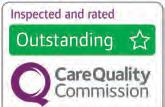
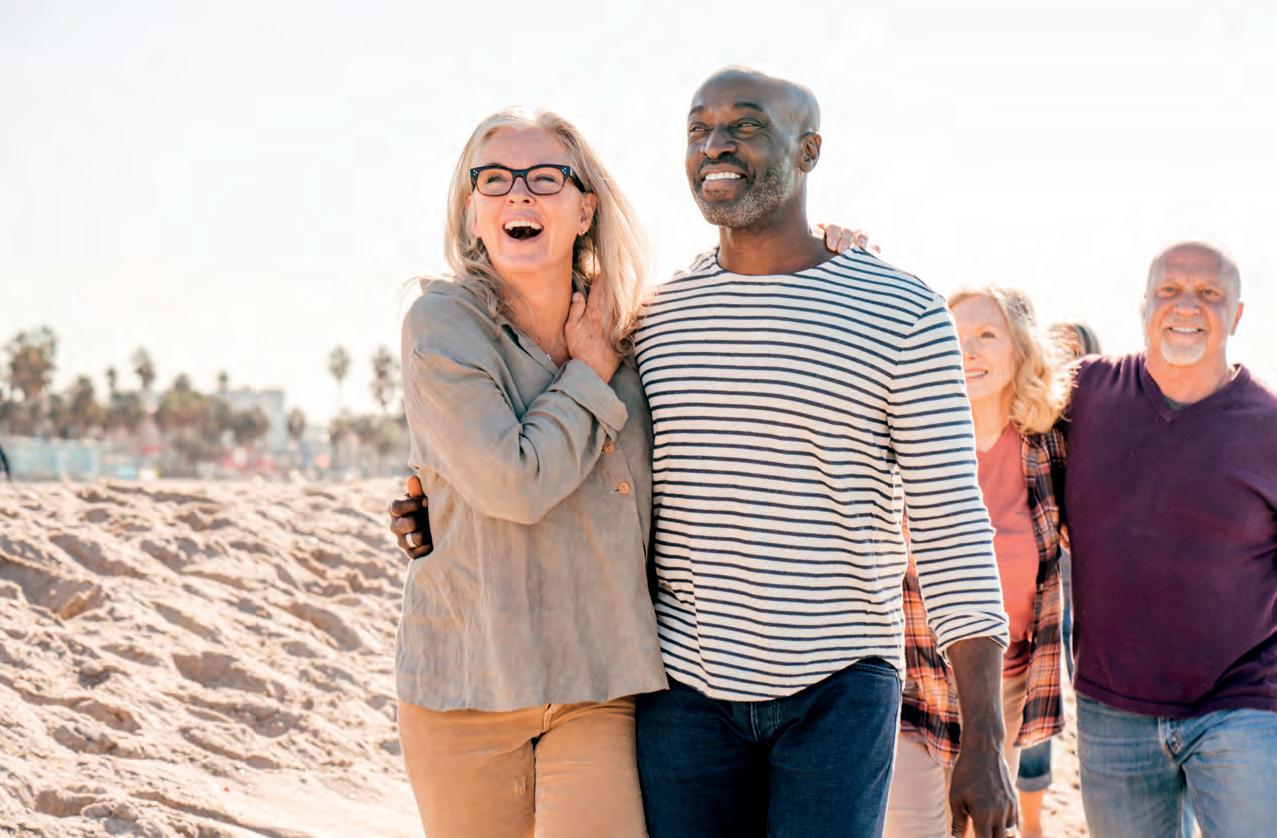
Watch live webinars via the Wellbeing Hub on the Benenden Health App
Ahandy wellness resource centre, the Benenden Health App offers tools to help you look after your health.
Provided by Spectrum Life on behalf of Benenden Health, the Wellbeing Hub is a comprehensive source of wellness information including healthy recipes, exercise videos and courses on topics such as sleep and mindfulness. What’s more, it’s continuously updated to bring you even more resources and features – see below.
New this year to the Wellbeing Hub is a programme of live webinars on fitness, health and wellbeing topics. Presented by experts, these interactive events can be watched in real time or on demand at a time to suit you. Topics include tackling mental health, advice on stress management, and ways to achieve a healthy sleep routine.
FEBRUARY

l 1st – World Cancer Day
l 8th – Infertility awareness
l 15th – Improving personal relationships
l 22nd – Mental health and stigma
MARCH
l 1st – Eating disorder awareness
l 8th – International Women’s Day
l 15th – World Sleep Day
l 22nd – Managing stress
It’s easy to stay up to date about live webinars coming soon on the App. Simply sign up to our email newsletter via your My Benenden Account.
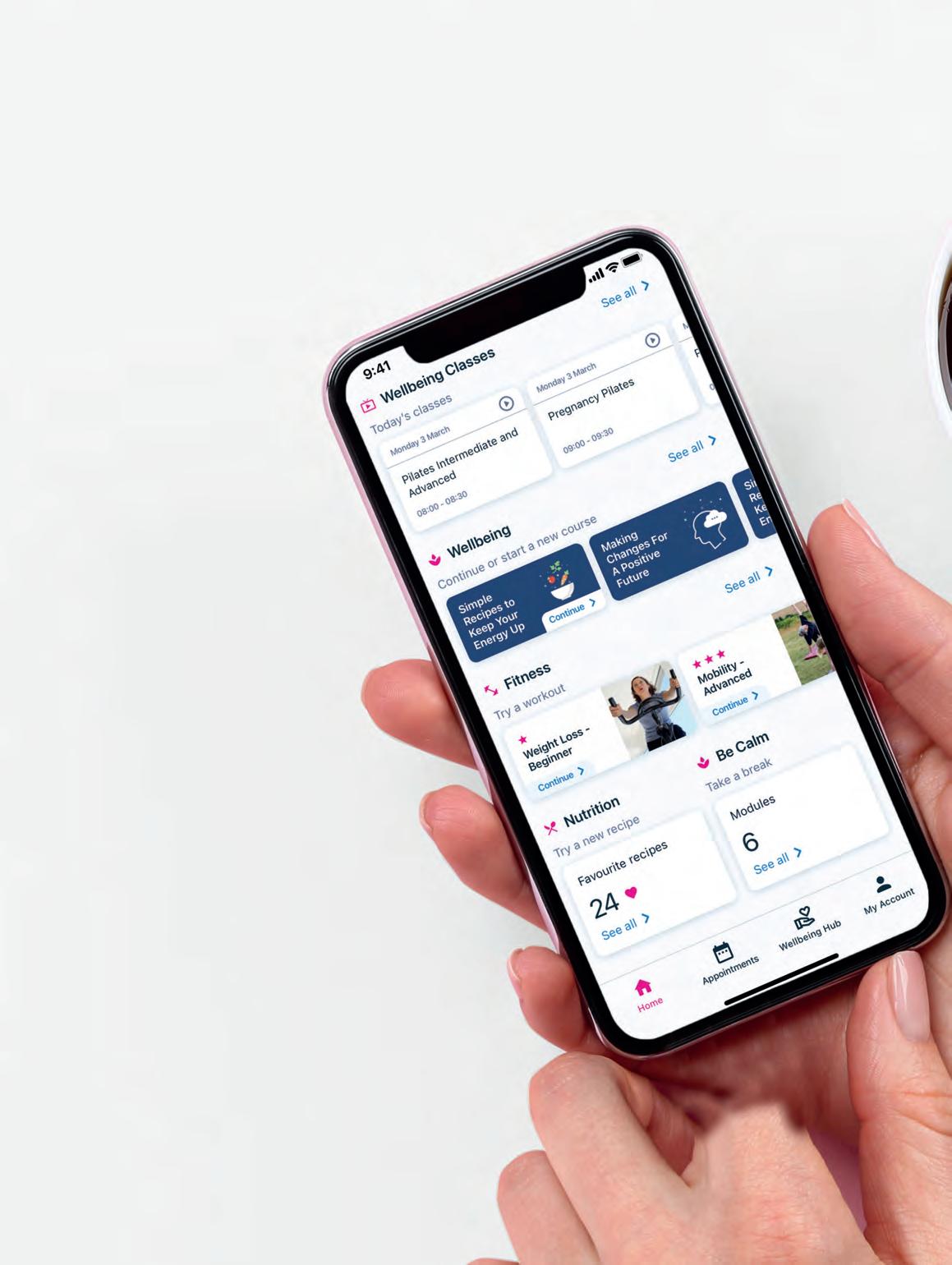
Scan the QR code on the right to download the App. Alternatively, go to the Apple App Store or Google Play.

To use the Benenden Health App, you must have registered for a
My Benenden Account. You can use these credentials to log in to the App or if you haven’t already done so, you can easily create an account via the App or online at my.benenden.co.uk




Knowing your own body and being aware of any changes is a vital part of checking in and maintaining your health. Here’s some expert advice on getting started and setting some wellness goals for the year ahead
BY JULIE PENFOLD

Fun and fitness are key to staying healthy







What’s on the outside is a reflection of what’s on the inside How your skin looks and feels can be a great indicator of what’s happening on the inside. For example, dry skin can be a sign that you’re dehydrated. What we eat and how well we sleep can also affect our skin health.
“While it’s recommended to carry out a full body check once a month, I advise checking your skin every three months as it’s a more realistic goal,” explains Dr Kurt Ayerst, senior dermatology consultant at Benenden Hospital. “To carry out a skin check, put around 10 minutes aside, stand in front of a fulllength mirror and scan from head to toe, on the front and back of your body.

“When you see something new or different, don’t panic but don’t ignore it. It’s very likely it won’t be anything to worry about but it’s a good idea to see your GP.

“Taking photos of your moles can help you to compare them over time. Mole differences to look out for include a change in size, elevation or colour, and if they start to itch.”

Why you should aim to move more and sit less Physiotherapy lead at Benenden Hospital, Jordan Dehara, feels people of all ages can benefit from following World Health Organization guidance to do 150 minutes of moderate-intensity exercise per week. This can be spread across four or five days and can be any form of activity you enjoy (as you’re more likely to keep it up).
“It’s important that you move more and spend less time sitting as this is bad for your health,” advises Jordan. “Setting an alarm to remind you to walk around after an hour is a great way to break up sedentary periods.”
Cheryl Lythgoe, Society Matron at Benenden Health, adds that non-exercise activity thermogenesis
(NEAT) movement is also important. This is all the daily movements that expend energy, except for sleeping, eating and carrying out structured exercise.
Increase your NEAT level by marching on the spot while you wait for the kettle to boil or doing a few squats while brushing your teeth. The goal is to move more –in any way you can.
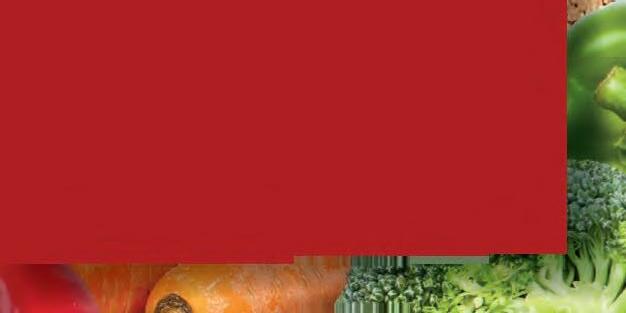
“If you regularly empty your bowels without any issues, it’s a sign of good bowel health,” says Mr Jacek Adamek, consultant general and colorectal surgeon at Benenden Hospital.
“Checking your poo is a good way to establish whether or not everything is in order. Symptoms such as having blood in your stools, chronic diarrhoea or constipation, bowel








incontinence or pain could indicate bowel disease. Urgency to go to the toilet is a common symptom of gastrointestinal conditions such as inflammatory bowel disease (IBD) and irritable bowel syndrome.”
Mr Adamek adds: “Bloating after eating could be due to eating too quickly or it could be suggestive of food intolerance or a condition such as IBD.”
One thing at a time Don’t overcomplicate things when it comes to changing your diet, advises Society Matron Cheryl Lythgoe. “Start with one aspect of your diet such as switching from whole milk to semiskimmed,” she explains. “If you’re aiming to eat your five-a-day, try to eat more vegetables than fruit as this helps you add more colour to your meals and provides a better range of vitamins, minerals and nutrients.

“If you have a weight loss goal in mind, break it down into smaller steps and simply focus on your immediate mini-goal such as losing just two pounds to start with.”

Healthier ways to de-stress
Many of us may drink alcohol to de-stress, but we need to find healthier ways to minimise stress, advises Cheryl Lythgoe.
“Drinking over the recommended 14 units of alcohol per week can increase your risk of certain cancers. Instead of drinking alcohol,
try de-stressing with a kitchen disco, go for a walk or have a relaxing bath instead.”



Getting outdoors into nature via a daily walk is another way to reduce stress and become more present and aware of the sights, sounds and smells that are all around you.
If you have any health concerns, please do check in with your GP. Alternatively, call our 24/7 GP Helpline to make an appointment or our 24/7 Mental Health Helpline on 0800 414 8247

1
HowdoIfeelafter food?
Check in withyourself after meals – for example, doyou feel bloated or gassy afterfood?
2 AmIchecking mypoo?
Colour and consistency are good indicators of your health.
3 AmI adequately protectedfrom thesun?
ApplySPF30 sunscreen before you go outdoors and wear a hat for added protection.
4 AmIgetting enoughvitaminD? We get most of our vitamin D from the sun but need supplement support in the colder months.
5 AmIupto datewith myvaccinations? Keeping up to date with your annual flu and Covid
booster jabs will bolster your immunity.
6 HaveIhitmy five-a-day?
Tryto add one more portion of veg toyour meals – soups or smoothies are easyways to upyourveg intake.

7 HaveIbeen outsidetoday?
Getting out into the fresh air is beneficial foryour mental and physical health.
8 Doesmyskin look different?
Getting to know your skin better can help you to spot anything new or different such as a changed mole.
aim to drink at least 2 litres a day.
10 What’smy alcoholintake?
We’re advised to have at least two alcoholfree days perweek.
sleep is very common but if worries are regularlykeeping you awake at night, ask for help.
15 WhendidI lastcheck mybreasts?
Athorough check includes feeling along the four quarters of your breast and under the arms.
16 WhendidIlast checkmytesticles? It’s important to check regularlyfor anyunusual lumps or bumps.

17 Howmuchhave Imovedtoday?
Tryto incorporate more movement intoyour dailyroutine as much as you can.
9



AmI drinking enoughwater?
Straw or Champagnecoloured urine means you’re adequately hydrated.You should



11 DoIgetoutof breathmore thanIusedto? Getting in the habit of moving more can help to graduallyincrease yourfitness levels.
12 DoIgotothe looalittle toooften? We all vary in how regularlywe go but be on the lookout for changes toyour usual routine.
13 WhendidIlast getmyblood pressurechecked?
It’s important to knowyour numbers as high blood pressure often has no symptoms at all.
14 Howwellam Isleeping? The odd night of poor
18 HowwellhaveI movedtoday?
Ifyou’venoticedyou feelstiffwhenyou getoutofachair oryou’renursing anigglinginjury, maketimefora physiochat.
19 HowwelldoI managestress?
Finding ways that work foryou is keyto minimising the effects of stress onyour health.
20 Whatmademe smiletoday?
Noticing the good things that happen each dayis important foryour mental wellbeing.
Many health conditions, like high cholesterol or vitamin D deficiency, give you no warning signs as they are often symptomless in their early stages. A health assessment can help identify your risks of hidden illnesses, which may become more serious if left unchecked. By highlighting areas that may need your attention, you can take control of your health today and keep well tomorrow.
assessments are provided in partnership with Bluecrest Wellness and take place in meeting rooms within hotels or conference centres. We ensure the same quality tests you'd expect from a hospital but in a relaxed and convenient setting.
As a valued Benenden Health member you can save up to £40 on the cost of a health assessment. Plus, if you choose a Benenden Ultimate health assessment you will receive a free vitamin D test. An ideal test during these darker winter months.
Your body produces vitamin Dafter sunlight exposure. But, few people in the UK get enough vitamin D, especially in the winter months. Vitamin D deficiency can create musculoskeletal health problems, causing various harmful conditions, including osteomalacia in adults. The key benefits of vitamin D include:
08271017).

How well we sleep has a direct link to our health. Here’s a look at some common factors that affect sleep as well as some ways to improve our sleeping habits
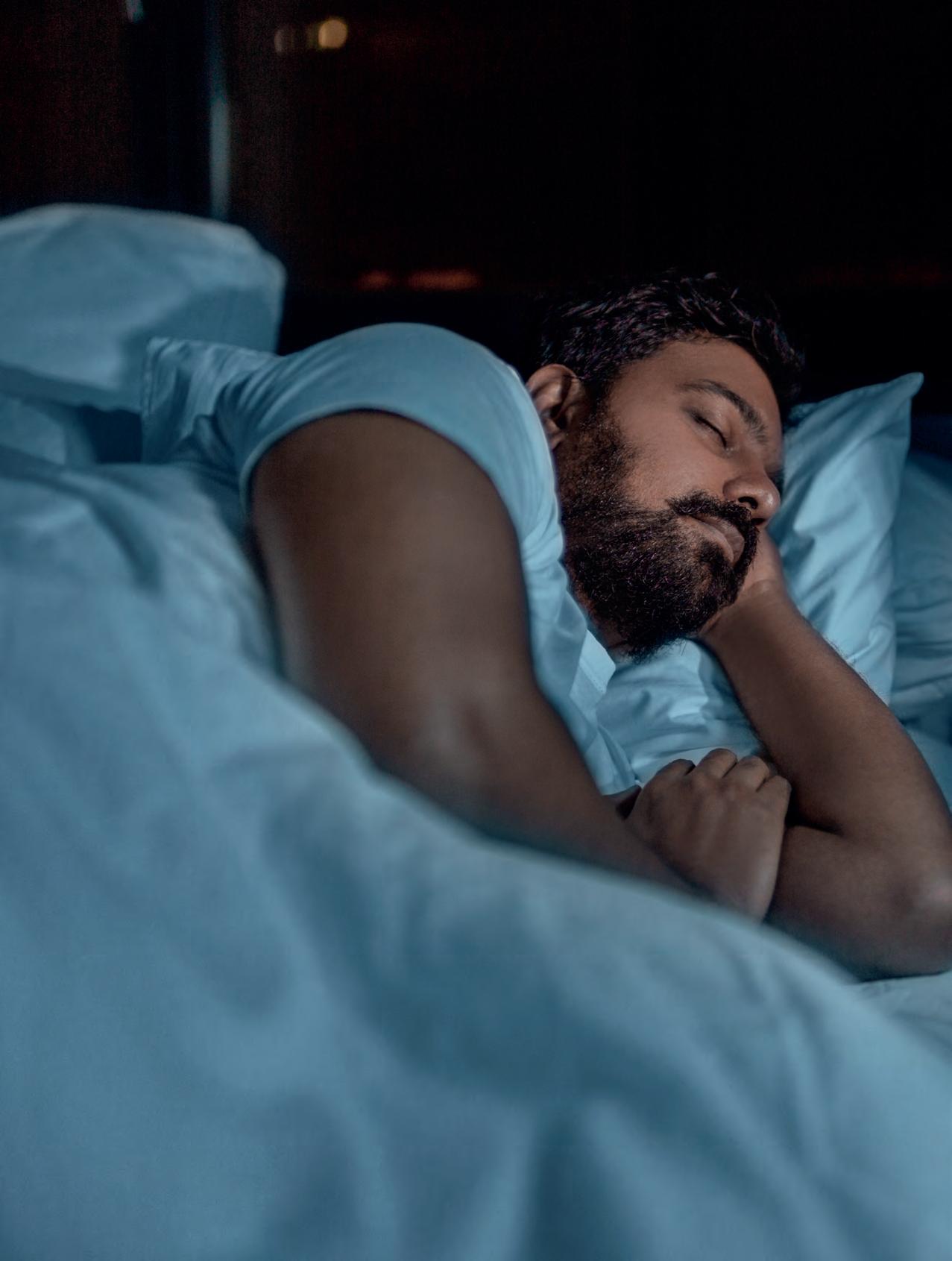 BY PENNIE TAYLOR
BY PENNIE TAYLOR
leep is something we spend around a third of our lives doing. It’s essential for healthy bodies and minds. Lack of it is associated with conditions such as high blood pressure, heart disease, diabetes and depression. Yet too few of us enjoy a good night’s sleep.
As you slumber, your body cycles through three stages of non-REM sleep (when you sleep more deeply), followed by a short period of REM sleep (when you dream). A full sleep cycle takes about 90 to 110 minutes and a good night’s sleep involves five or six such cycles.
The immune system and the body’s organs are rested and restored by a full sleep cycle, triggering the release of hormones that improve resistance to infection. Deep sleep is also thought to help regulate the protein that causes stress and inflammation and protects against insulin resistance, which is associated with type 2 diabetes and heart disease.
Research by Benenden Health found that just 32% of people in Britain are achieving the recommended seven hours of settled slumber each night. The vast majority report regular wakefulness, citing stress, noise, discomfort and going to bed too late as common reasons. Anyone who has suffered occasional insomnia knows the resulting effect on mood, concentration levels and cognitive ability. But chronic sleep deprivation – where sleep patterns are significantly disturbed over time – puts people at serious risk of disease and even shortens lives.
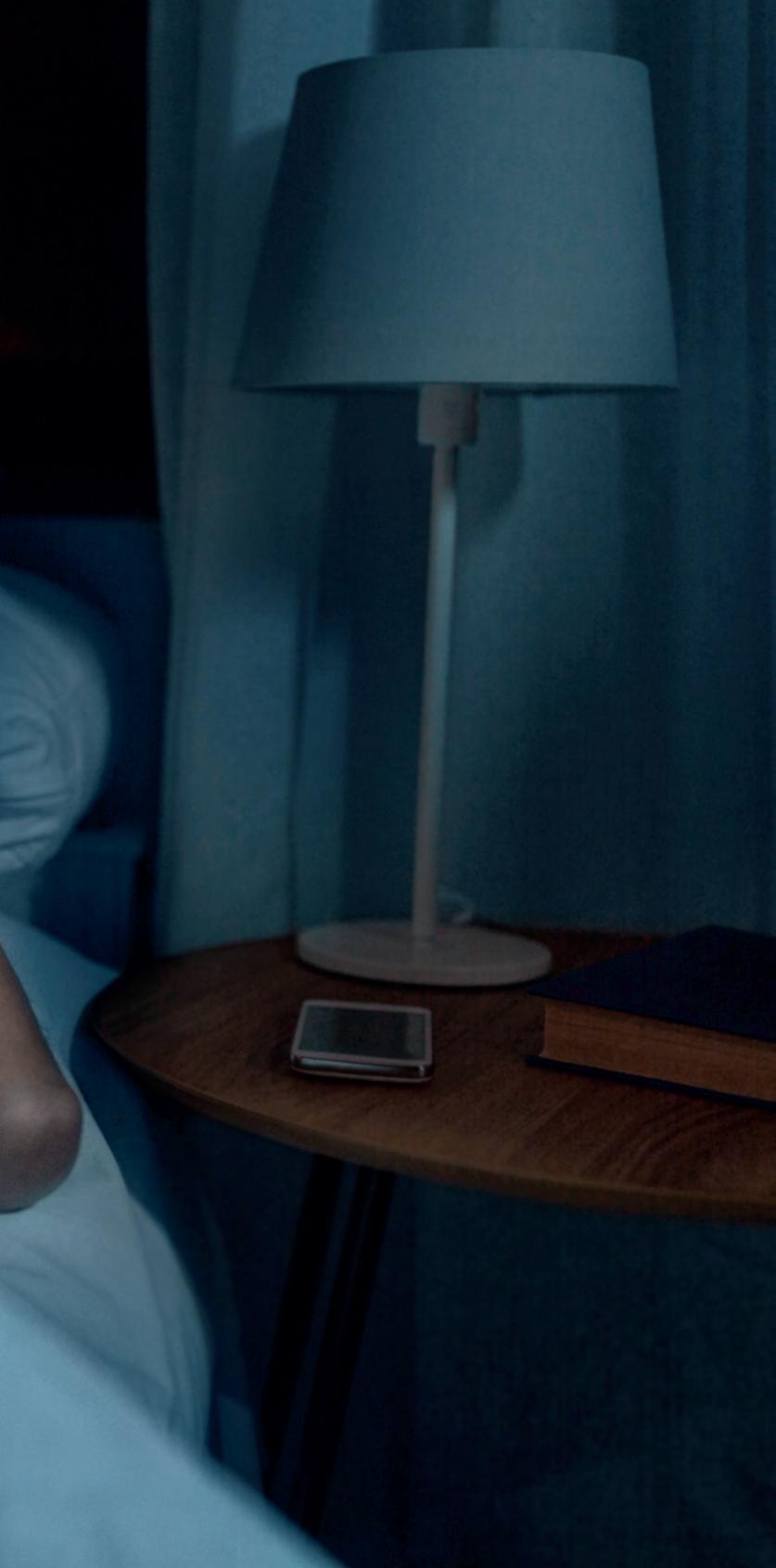
A two-decade study of 8,000 UK civil servants, published in October, showed that those who slept five hours or less around the age of 50 had a 30% greater risk of multiple ailments than those who slept for seven hours. Shorter sleep at age 50 was associated with a higher chance of death, largely due to the increased risk of chronic disease.
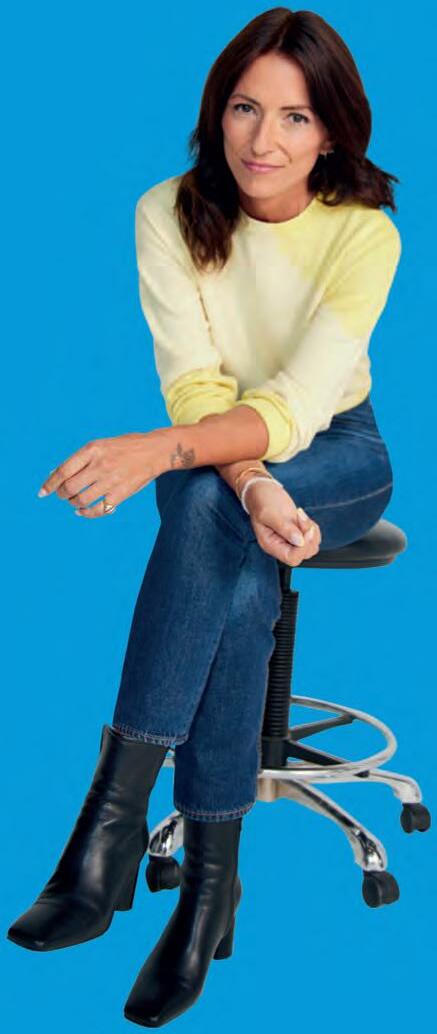
“Sleeping is a hugely underrated part of our lives,” says consultant bariatric surgeon Ahmed Hamouda, who practises at Benenden Hospital. “Basically, if you don’t get good-quality sleep, you are less able to cope physically and emotionally.”
As a doctor who has spent many nights on call, Mr Hamouda has personal experience of sleeplessness, and now treats patients whose lives are blighted by it with weight loss surgery that can alleviate their sleeping problems. “Many of the people who come to me can’t sleep because their airways are restricted by weight gain and they find it hard to breathe when they are lying down, which can lead to obstructive sleep apnoea,” he says. “Their relationships suffer and their mood and energy levels are permanently low. It’s a quality-of-life issue that needs to be sorted out.”
Transform your life by reducing the health risks associated with being overweight. Fast access to a range of permanent and reversible treatment options in an infection-free environment, available to everyone. As one of the top providers of private treatment within England for the gastric band, our highly experienced team is here to support you at every step.* 115 years of keeping you safe.



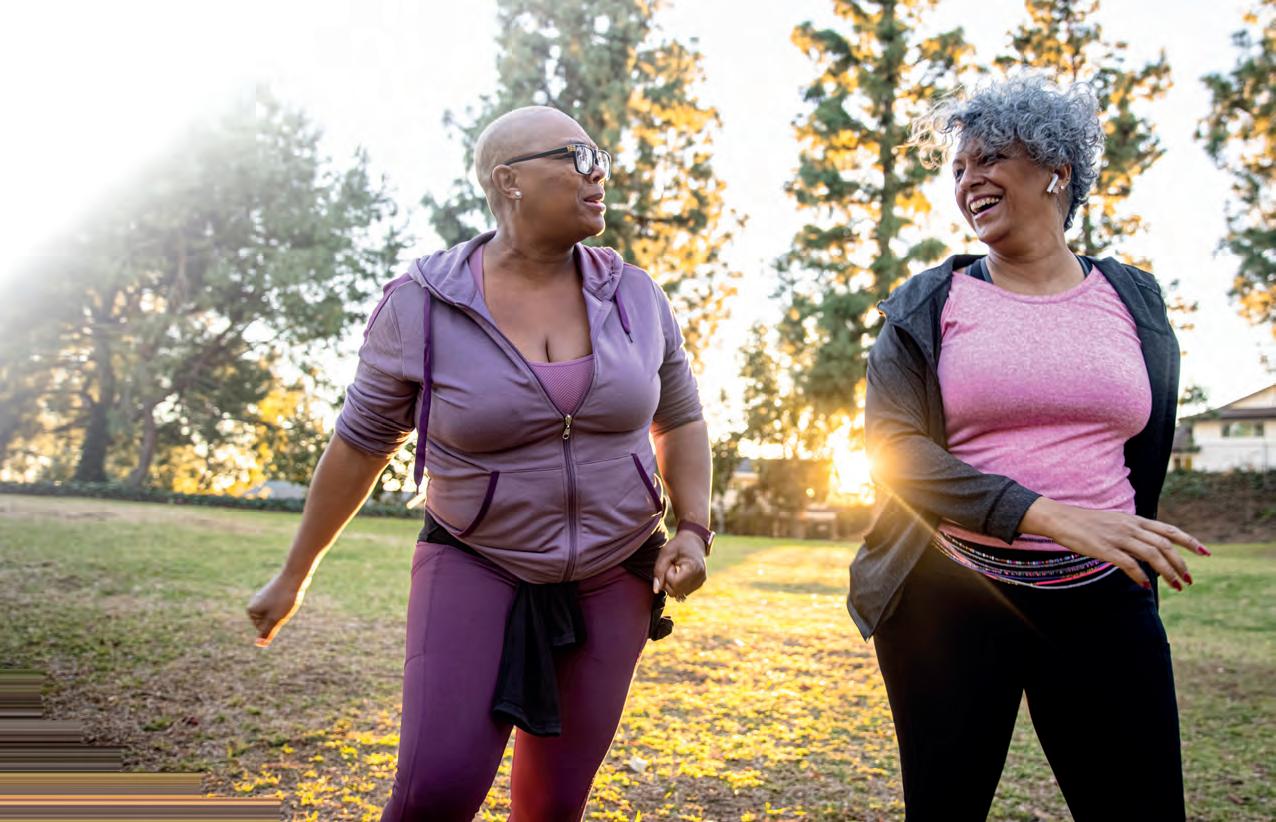
Ifyou are having trouble sleeping or are concerned about sleep apnoea, talk to your GP.You can also call our 24/7 GP Helpline on 08004148247, 24 hours a day, seven days a week, to book an appointment with a GP or log on to the Benenden Health App .
People affected by sleep apnoea typically snore and make gasping and choking noises during sleep that wake sufferers and partners alike. “At the mild end, people who snore do not experience particular issues with their sleep, other than domestic strife,” says ear, nose and throat (ENT) consultant Henry Sharp, who practises at Benenden Hospital.
“Snoring can, however, co-exist with obstructive sleep apnoea, where people can stop breathing altogether while asleep, causing their oxygen levels to drop and the brain to force a big intake of breath to compensate. It is alarming to experience and results in daytime sleepiness.
Around 1.5 million adults in the UK are thought to have obstructive sleep apnoea, where breathing stops and restarts suddenly. At its worst, this can happen hundreds of times each night.
The most common cause is obesity, but it can be due to hereditary factors such as neck size
“The main thing to do is to have the anatomical cause of disruptive snoring investigated by an ENT specialist, who can advise on the best approach to tackling it.”
Sleeplessness is also a feature of the workload of consultant orthopaedic spinal surgeon at Benenden Hospital Omar Mohamed. “My patients have often suffered back pain for weeks, and that makes sleeping well very difficult for them, and lack of sleep can make things feel so much worse,” he says. “We encourage regular exercise, which can significantly improve sleeping patterns. Getting sleeping problems sorted improves wellbeing overnight.”
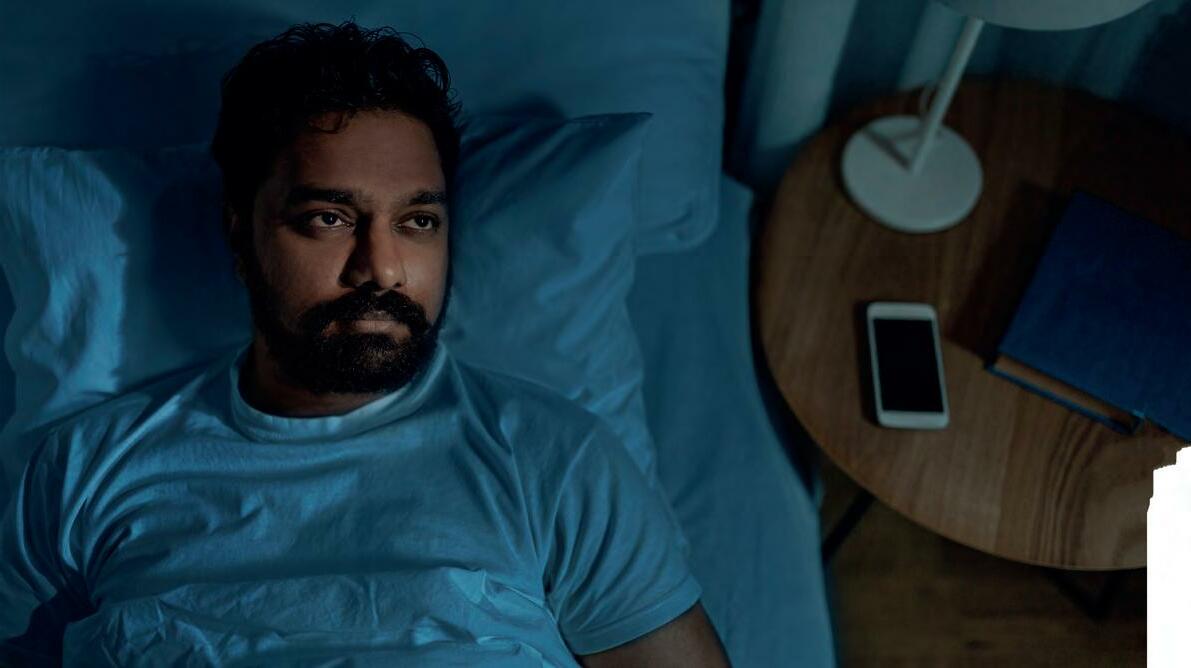
and is also associated with smoking, overdrinking or using sleeping pills. Middle-aged men and post-menopausal women are most at risk.
GPs can refer patients with suspected sleep apnoea for a sleep study – polysomnography– to track oxygen levels and explore possible causes.
Non-surgical treatments include mandibular advancement devices, similarto gumshields that are made bydentists to keep the jaw open, and continuous positive airwaypressure (CPAP) devices that use a mask to pump air directlyinto the airways.
Affecting one in three people in the UK, insomnia can be triggered bya wide varietyof causes including depression, anxietyand menopause. Instead of taking sleeping pills, problem sleepers are encouraged to follow some evidence-based self-help advice.
Good habits to helpyour sleep include rising at a regulartime, taking dailyexercise (preferably aerobic exercise), spending time outdoors, eating healthilyand choosing lighter meals later in the day, limiting stimulants such as coffee, avoiding alcohol and tobacco, and going to bed at a regulartime.
Replace an uncomfortable mattress or bedding, adjust the room temperature, remove clocks and electrical devices, dim the lights and close curtains or blinds.
To avoid 40 winks during the day, go for a walk orfind another distraction instead.
Some people who suffer longterm insomnia (sleeplessness that lasts more than three months) find talking therapysuch as cognitive behavioural therapy beneficial as it can change ingrained behaviours and habitual thoughts that affect sleep.
According to researchers, preparing a ‘to-do’ list before bed offloads the mind in preparation for more settled sleep.

‘Chronicsleepdeprivationputspeopleat seriousriskofdiseaseandevenshortenslives’
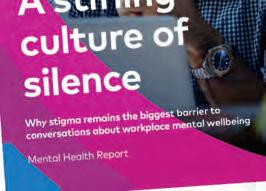
Awareness of the driving factors behind mental wellbeing issues at work may have grown in recent years – but a stigma around discussing those challenges persists, according to new research from Benenden Health.
Its report, A Stifling Culture of lence, has been produced following a dramatic change to the world of work since the pandemic. Barriers between work and home life have broken down and the ensuing stresses – now compounded by a cost-of-living crisis – are pushing many employees to a state of burnout.
Silence, to the world of work since the Barriers between and – are many to a 18 and staff financial with 10% since 2020 – with 56% of workers feel their organisation
sn dr~ sin WC an COl -a sta err Be1 WO WC co th int wi Wt 20 thP
Based on a survey of 1,000 employees aged 18 to 55, the Benenden Health research found that work-related stress, workload levels, workplace bullying and staff financial concerns are all on the rise. Although the need for conversation has increased, employees’ comfort level with discussing their mental wellbeing has dropped by 10% since 2020 – with 56% of workers saying they don’t feel their organisation cares about their mental health at work.

While 77% of employees cite the cost-ofliving crisis as a real issue, 47% are uncomfortable with voicing their concerns to employers – and just 1% of organisations specifically include financial health in their wellbeing strategy plans.
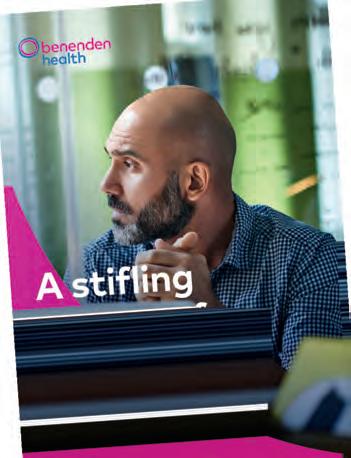
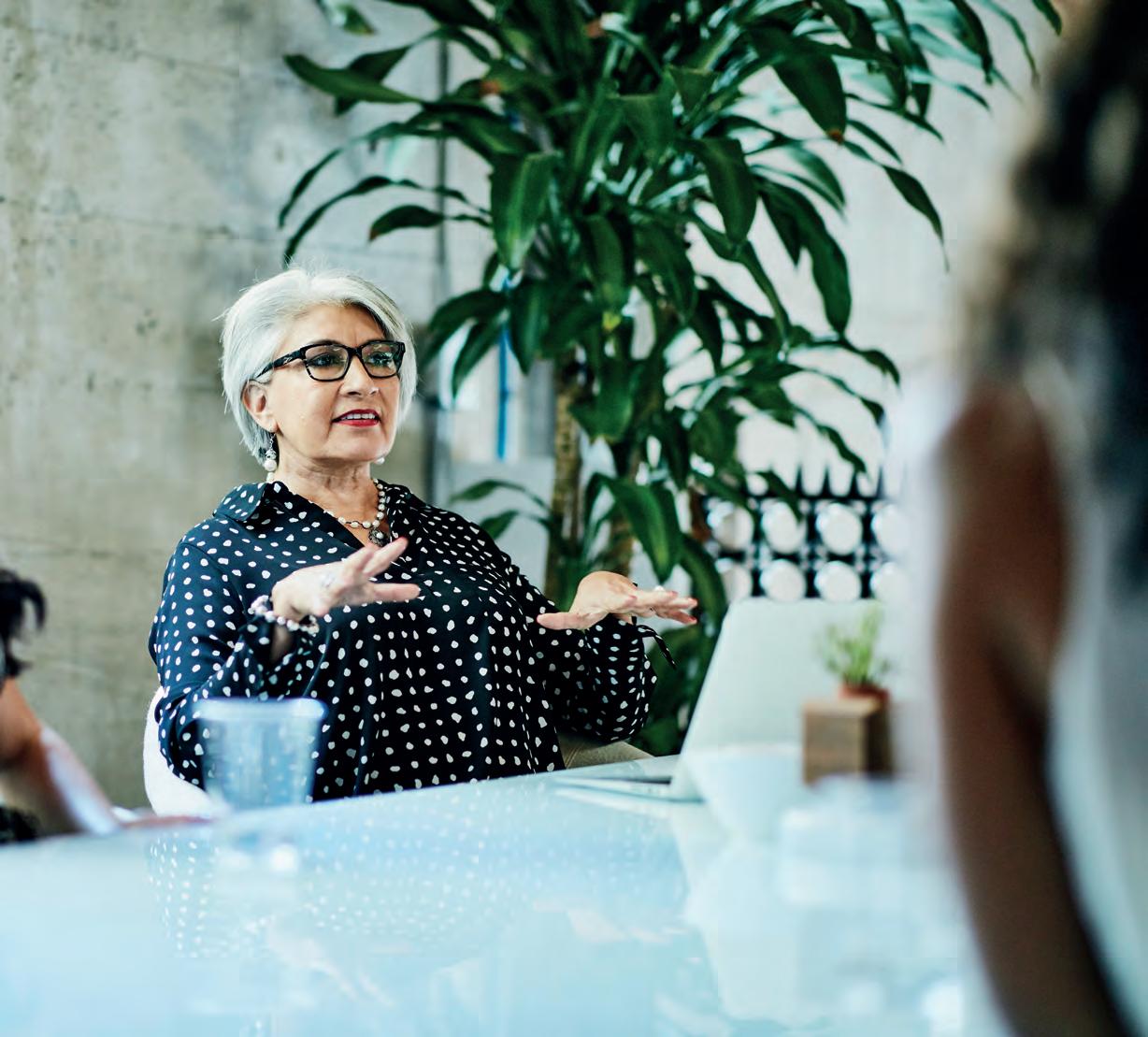
Further findings suggest a significant disconnect between employees’ perceptions and employers’ willingness to help:
l 81% of employers say they would feel comfortable with having mental wellbeing discussions with staff;
l More than 70% say they offer, and follow, a workplace mental wellbeing policy; and l 52% said they offer financial support via financial advisers and other services.
Although the report highlights a 6% decrease since 2020 in the number of employers who say they genuinely care

A Benenden Health report reveals how a reluctance to speak about mental health challenges in the workplace is affecting employees and employers alike
‘The employee who’s suffering may feel guilty or weak. A line manager may worry about saying the wrong thing’
about employee mental wellbeing, the findings indicate that the majority of organisations do want to help – they just don’t know how to, or claim not to have the time. Indeed, fear of saying the wrong thing emerged as the biggest reason why employees and employers alike feel uncomfortable with discussing mental wellbeing.
So, what could be a solution? “The first step would be to remove blame from the equation,” says executive coach and business psychologist Dr Michael Drayton – author of Anti-burnout: How to Create a Psychologically Safe and High-performance Organisation
“Talking about mental health is hard,” he says. “We have employees who are
desperate for help and employers who want to help them – and no one is doing anything bad or wrong. It’s the stigma that gets in the way.”
He notes: “The employee who’s suffering may feel guilty or weak, or be worried about being judged. A line manager may worry about saying the wrong thing and making things worse. So, both end up ambivalent about the discussion and may avoid it.”
Dr Drayton points out that the organisational risks of not addressing these issues are considerable. “The employee can easily get caught up in a spiral of decline culminating in burnout – becoming simply unable to work. The employer could end up losing a highly conscientious member of staff – and conscientious workers are typically at high risk of burnout.”
In Dr Drayton’s view, boosting workplace mental health training is key. “There are three steps here: spotting the warning signs, knowing what to say to the suffering employee and then knowing how to refer them on to any relevant, external resources.”

Benenden Health’s head of organisational development, Naomi Thompson, says: “Our findings suggest there is still a lot of work to do to create cultures where people can speak freely about their mental health at work, with many employees continuing to struggle in silence.”
She notes: “Success depends on employers’ commitment to listen because feedback forms the backbone of progress. This has become even more important over the last couple of years as we have all faced so much change. Organisations are different now and we need to recognise that so are the needs of the people who work for them.”
To read the full report, visit benenden.co.uk/healthcare-for-business/ mental-health-report
WANT TO HELP 59% of businesses know the legal requirements around providing support for mental wellbeing needs in the workplace 63% of employers said they have asked employees what they would like to see from them in terms of mental wellbeing support provision 60% of businesses say they currently provide mental wellbeing awareness training to line managers 80% of employers agree that mental health awareness training would be beneficial for their company
BenendenCharitableTrusthelpedSashaDeshifind herindependencebyfurnishinghernewflat
Twenty-eight-year-old Sasha Deshi has been through a lot. After suffering a brain haemorrhage aged 12, she has had to adapt to a life with disabilities.
Byher side has been her mum,Jas, who works in customer services at Benenden Health, and her sister, Manisha. “I get inspired byher,” says Jas, who is proud of Sasha’s achievement in completing a theatre arts and media degree at university in Middlesbrough.
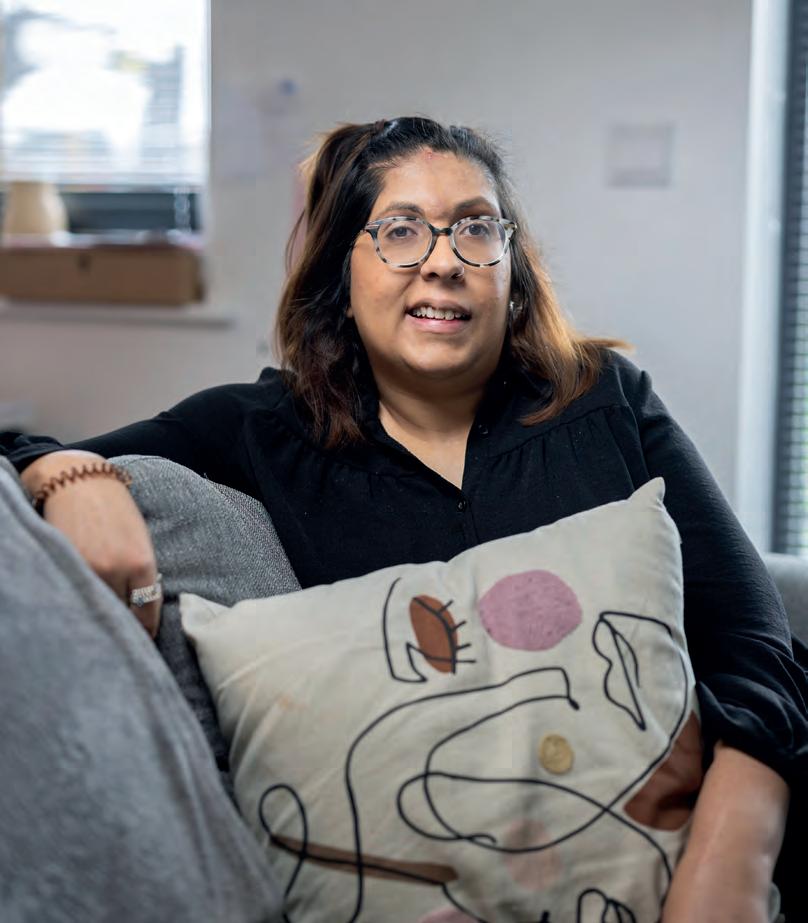
Sasha subsequentlydecided to do a postgraduate certificate in education to fulfil her dream of becoming a teacherbutunfortunatelyexperienced another knock-back. She had an
occurrence of an arteriovenous malformation (AVM) in her brain and needed more surgery.This resulted in her losing hervision in her left eye and being left partiallysighted in her right eye.
Undeterred, Sasha still craved her independence and, with the help of York Social Services, was offered a brand new, speciallyadapted flat. However, it was an emptyshell.
“Myimmediate thought was that I was going to have to get everything on credit,” recallsJas. A chance meeting at work gave herthe idea to applyfor support from Benenden CharitableTrust. Following a successful application, the familywas
BenendenCharitableTrust providesfinancialassistanceto currentandformermembersof BenendenHealth,aswellas friendsandfamilynamedon anotherperson’smembership.

Wecanagreegrantsofupto £3,000foravarietyofhealthrelatedneeds,includingspecialist equipmentandhomeadaptations, aswellasfinancialassistance wheremanagingeverydayliving costsisastruggle.Wecanalso helpinunexpectedsituations whicharen’trelatedtoahealth condition,suchasbereavement, divorceorredundancy.
l Applyonlineordownloadaform atbenenden.co.uk/charitable-trust
l Calluson08004148450(MonFri,8am-4pm)todiscussyour circumstancesandtorequestan applicationform
l Emailusatcharitabletrust@ benenden.org.uk
able to purchase white goods and new flooring.
“The funding helped Sasha and me ensure she has a flat that’s completely finished,” saysJas. “Without it, buying the big items would have left me in a lot of debt. It’s been mentallyand financiallyso much easier.”
“Ilovemyflat–it’smademefeel muchmoreindependent,”saysSasha. “It’shomenow.”
Benenden Charitable Trust is a company limited by guarantee registered in England and Wales, company registration number 05213807 and a charity registered in England and Wales, number 1106287. Registered Office: Holgate Park Drive, York, YO26 4GG
Living without adequate heat, light or power is the daily reality for increasing numbers of people in the UK who can’t afford to top up their prepayment meter.
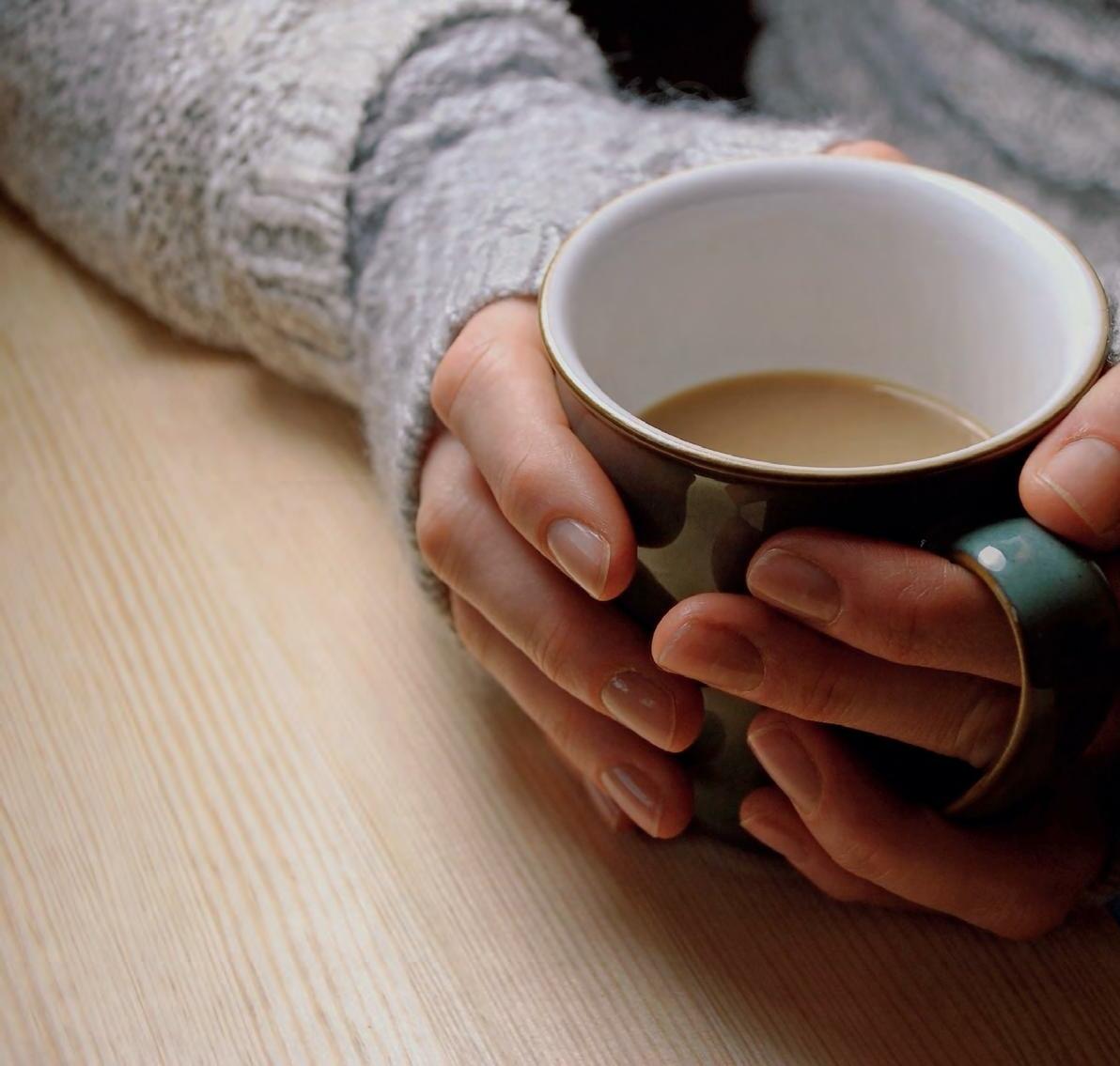
Fuel Bank Foundation defines this as “fuel crisis” and is the only national charity to focus on providing immediate, tangible help to those in desperate need.
The charity evolved from an npower customer vulnerability initiative managed by Matthew Cole, now head of Fuel Bank Foundation. “Historically, vulnerability was something companies used to think about on a Friday afternoon when they had nothing else to do,” says Matt. “This changed about 8-10 years ago, when


there was a greater expectation on companies to think about vulnerable people. We asked the question: if you were a customer who went to the corner shop to prepay your fuel and couldn’t afford to, what would happen? There were just two options: ration or switch off. It was a penny-dropping moment.”
People who prepay for energy are more likely to be living on a restricted income yet, conversely, they need more cash in their pocket for fuel. While the average direct debit customer pays around £200 a month for energy, spread over the year, the prepay customer needs to find around £350 in the colder months. The npower initiative pinpointed something quite simple: that people struggling to pay their
FuelBankFoundation wasestablishedin2016 tosupporthouseholds infuelpoverty.Today, withthecost-of-living crisisescalating,the charityisplayingamore vitalrolethaneverMatt Cole:
“When Covid hit, demand went through the roof”
Food banks help identify people who may need support to pay fuel bills
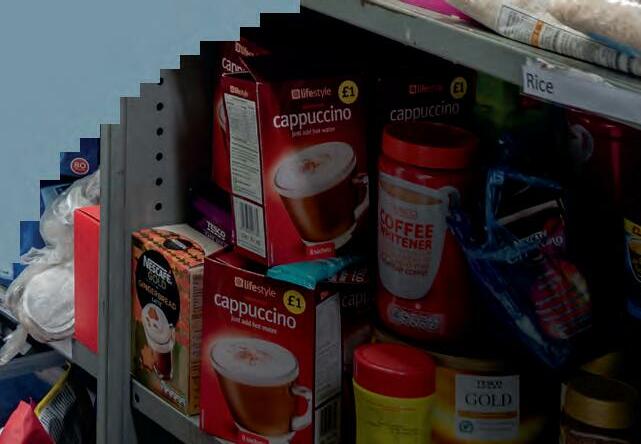
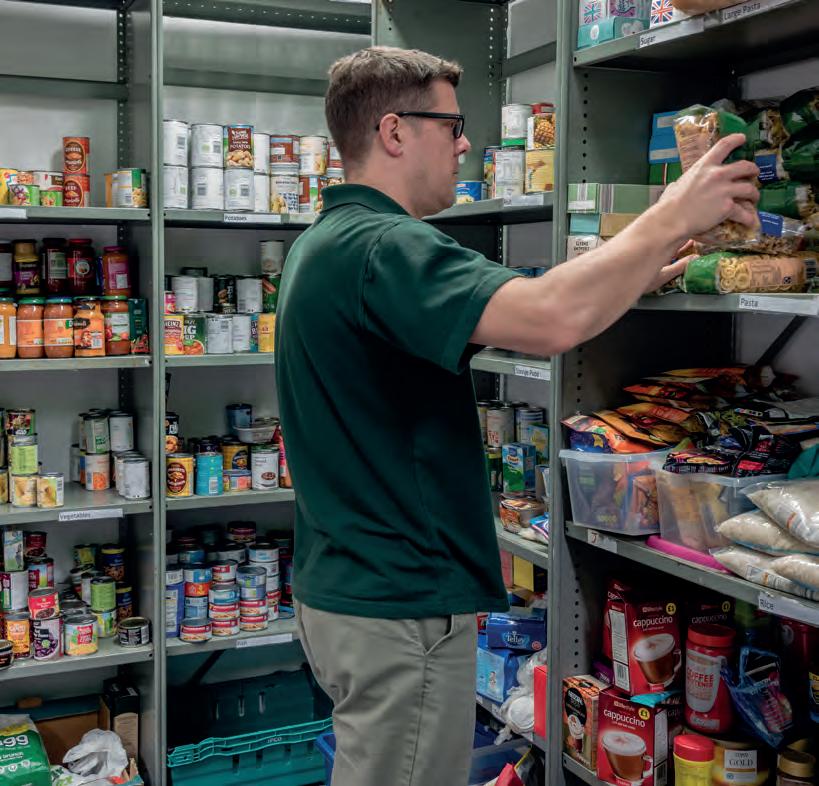
“When you don’t have heat or light or power, life becomes really tough,” says Matt. “People develop coping strategies, such as going to McDonald’s at night to eat hot food in the warmth or paying 50p at the swimming baths so the children can have a hot shower. A grandmother was so worried that her grandchildren wouldn’t want to visit a cold house that she would blast the heating and cook chicken only when they came; the rest of the time she put up with an unheated house and cold food.
“Living like that has an impact on mental health.”
What is the solution in the longer term? “We’re asking the government to make a choice,” says Matt. “We see the negative impact of people living without energy. If you’re a kid and you don’t have wi-fi at home, it limits your ability to study. If you live in a cold house, you’re more likely to have a respiratory illness and be admitted to hospital.
“To be fair, the government has introduced the Energy Bills Support Scheme and price guarantee. But it’s based on an average household cost of £3,000 a year for fuel, and the cost to heat a home varies hugely. There’s a charity in Scotland that says it’s more like £4,500 for their client base. The government needs to offer support based on what people are paying now, rather than giving a standard sum. By the new year, three quarters of a million people will have been through our service. That doesn’t feel sustainable.”
fuel bills would probably be battling to purchase other essentials, like food. This led to food banks playing a crucial role in identifying individuals in fuel crisis.
After npower merged into E.ON, the fully independent Fuel Bank Foundation was born. The initial idea was to set up a dozen centres around the country. “And then this thing called Covid happened,” says Matt, “and suddenly demand went through the roof.”
The charity now helps around 1,000 people daily and has supported more than 650,000 people to date. It works with a network of partners, including food banks, GP surgeries, school offices, advice agencies and charities such as Macmillan, to deliver the service.
“Our model is based on a trusted intermediary, which means when one of

our partners comes across someone who is struggling, they refer them to us. We complete additional checks to make sure everything’s above board — then get the heating back on the same day.”
Help comes in the form of vouchers or QR codes, worth £30 to £50 (depending on the time of year), to be used for the fuel prepayment meter. It’s a short-term solution; a chance for people to heat and light their homes until they get back on their feet. To cope with the longer term, the charity offers advice, such as how to contact energy suppliers for help or check entitlement to government support.
It also dispels dangerous, albeit well-meaning, advice, such as cooking on a barbecue to save energy — fine outside in the summer but do it in the kitchen in winter and you could die from carbon monoxide poisoning.
Meanwhile, in addition to corporate contributions, the charity has seen a significant surge in donations from the public, partly because the cost-of-living crisis is at the forefront of everyone’s minds, and partly because those who don’t need their energy rebate payments are donating them.
“When we first set up the charity, people loved what we did, but they felt it was a government problem to solve,” says Matt. “Things have changed. We’ve received £250,000 in donations since Easter. Every pound that’s donated is spent on energy. That’s the vision. If you give £5, it goes straight to someone who needs it.”
‘Whenoneofourpartnerscomesacross someonewhoisstruggling,theyreferthemto us.Wegettheheatingbackonthesameday’ Findoutmore To
Benenden Travel Insurance is offered by Benenden Wellbeing Limited, an insurance intermediary, which is authorised and regulated by the Financial Conduct Authority (Financial Services Register number 593286). Registered in England and Wales (Company no. 8271017). Benenden Wellbeing Limited is a wholly owned subsidiary of The Benenden Healthcare Society Limited. The Registered Office of both is: Holgate Park Drive, York, YO26 4GG. Benenden Health is a trading name of The Benenden Healthcare Society Limited.


The insurance is underwritten by Zurich Insurance pie, authorised and regulated by the Central Bank of Ireland. Authorised by the Prudential Regulation Authority and with deemed variation of permission. Subject to regulation by the Financial Conduct Authority and limited regulation by the Prudential Regulation Authority. Details of the Temporary Permissions Regime, which allows EEA-based firms to operate in the UK for a limited period while seeking full authorisation are available on the Financial Conduct Authority's website. FCA firm reference number 203093.
Benenden Travel Insurance is arranged by AIIClear Limited, which is registered in Gibraltar company number 117274. Registered Office: 1st Floor, Portland House, Glacis Road, Gibraltar, GX111AA. AIIClear Limited is licensed and regulated by the Gibraltar Financial Services Commission number FSC25393 and trades into the UK on a freedom of services basis, FCA FRN 824283. Benenden Travel Insurance is administered by AIIClear Insurance Services Limited, registered in England No. 04255112. Registered Office: AIIClear House, 1 Redwing Court, Ashton Road, Romford, RM3 SQQ. Authorised and Regulated by the Financial Conduct Authority firm reference number 311244.
On Thursday 29 September 2022, member representatives gathered at our Special Conference in Leeds to make a groundbreaking decision on the future of Benenden Health’s democracy.
We called this Democracy for Tomorrow, and our goal was to modernise Benenden Health’s democratic structure and increase member engagement so we can continue to support you and your family for another 116 years.
This followed an astonishing response from our members to a mailing sent in July titled ‘A new democracy for Benenden Health is in your hands’. We asked members to make their voice heard by registering to attend a meeting or sharing their views on the Democracy for Tomorrow proposal. We received responses from 10% of our members, a huge increase from the 0.4% we typically see getting involved in decision making. Over 99% of the members who responded were in favour of the change.
So, the message from our members was clear: you wanted change and believed that together we can create an even brighter democracy for Benenden Health.
Your Conference delegates heard this message and voted in favour of the proposal at Special Conference. This means that Benenden Health is currently transitioning from a structure where representatives vote on behalf of members at Conference, to a new structure that was put forward by a group of member representatives. This aims to increase member engagement, create a stronger community, make decision making more representative and easier to access, and build a foundation for member discussions that are focused on healthcare.
Benenden Health Communities will focus on healthcare issues and how to better support members
We are introducing a new way for members to have their say using the following four key pillars:
Every member has a vote on the key decisions at Benenden Health, online or by post.
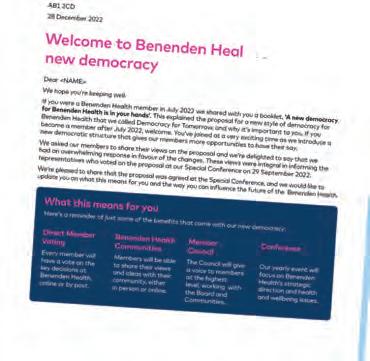
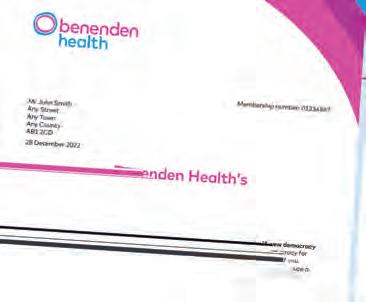
Members will be able to share their views and ideas with their
community, either in person or online.

This new group will be a bridge between our communities of members and the Board of Directors, giving a voice to members at the highest level.
Our yearly event will focus on Benenden Health’s strategic direction
and health and wellbeing issues to act as an open forum for the discussion of ideas put forward by members and the Board.
Here are some of the key dates to be aware of as we transition to our new democratic structure: l January – You’ll be sent a letter or email to let you know which Benenden Health Community you belong to. We have 19 communities across
the UK which act as forums for members to discuss Benenden Health, health and wellbeing and put forward ideas. The communication will also explain how to volunteer or self-nominate as a candidate for the Board
l Spring – The launch of your online community space
l May – Keep an eye out for your first Direct Member Voting Pack
Jf)'OU_.•oa........_,,Heo/thmerni,.,,in.July2022-shoradwith)'OUaboolc1et,·A-d.noc,.,ey tors.,,.....,Healthlllir,y,,urhot,d•••Thisexploin.dtt,_~lfor-a,_,ty1eol<1emocroqror Tomo,.._,_wh)'lt'alrnpo,tontto)':lu.lf)'OU • ota~•xcitwlgr;,,,.as-;,,troduceo ,_dernoc,at;,1t,ucturethot theirsay. W.~ou,rn,,n,bersto<haretl,w.._onthe"'-lordwe',_~le<lto1<1ythat..._ hodon.........,,.,m;ng,_info_,,.o,thact>ong.,,,n,.,_"""'•-•lntegralininfor-m.-,gtt,e .-.P,--ntowo,, who,-e<f ontt,-P<oi>osalat<>ur-Spe<;iotConfe,-enceon29Septemt,,.,-2022. We'r•Pleos.dto~thotthePf'GPOSol-<Jgr"ft<lattheSPl'acJIConfwiMq,CJr>dwewo.i1<11i1otto ui>dat•)'OUonwhotthismeo,,sfo,)'OUondtt,e..,,.,y)'OUconlnfluenctthe,,.,turtoft"- S.,,.r'ldw,He<Jlth.
l June – Our first new-style Annual Conference You can find out more about your new democracy, and how to get involved by scanning the QR code above or visiting benenden.co.uk/ haveyoursay





 * Full terms and conditions can be found at benenden.co.uk/renewal. Renewal date can be provided after completing a quote or via benenden.co.uk/homecover
** Lines are open between 9am and 5pm, Monday to Friday. Calls may be recorded for our mutual security and for training and quality purposes.
Benenden Home Insurance is offered by Benenden Wellbeing Limited, an insurance intermediary, which is authorised and regulated by the Financial Conduct Authority (Financial Services Register number 593286). Registered in England and Wales (Company No 8271017). Benenden Wellbeing Limited is a wholly owned subsidiary of The Benenden Healthcare Society Limited.
Registered Office of both: Holgate Park Drive, York, YO26 4GG. Benenden Health is a trading name of The Benenden Healthcare Society Limited
* Full terms and conditions can be found at benenden.co.uk/renewal. Renewal date can be provided after completing a quote or via benenden.co.uk/homecover
** Lines are open between 9am and 5pm, Monday to Friday. Calls may be recorded for our mutual security and for training and quality purposes.
Benenden Home Insurance is offered by Benenden Wellbeing Limited, an insurance intermediary, which is authorised and regulated by the Financial Conduct Authority (Financial Services Register number 593286). Registered in England and Wales (Company No 8271017). Benenden Wellbeing Limited is a wholly owned subsidiary of The Benenden Healthcare Society Limited.
Registered Office of both: Holgate Park Drive, York, YO26 4GG. Benenden Health is a trading name of The Benenden Healthcare Society Limited

●You can call our helpline or log in to the Benenden Health App 24 hours a day, seven days a week to book an appointment for a telephone orvideo consultation with a GP 08004148247
AFTER6MONTHS


●
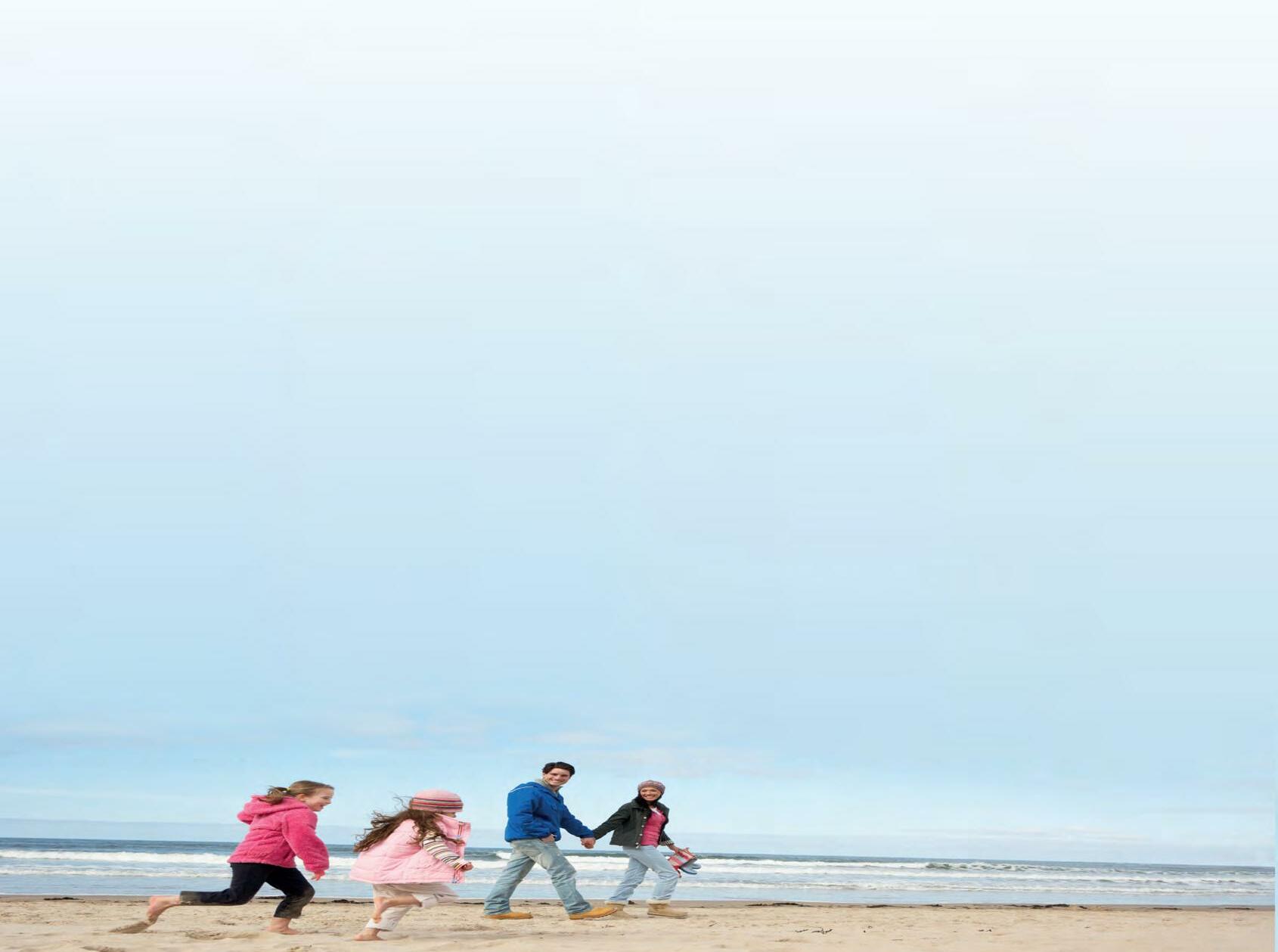
Doyouhave additional peopleonyour membership?
Additionalnamedpersons onyourmembershipcan choosetorequesttojoin aBenendenHealth Community,havetheir sayonthefutureof BenendenHealth,and receivetheirowncopyof BeHealthymagazine.Call 08004148107tomake thechange.
● What is the CCSD code?*


● Howlongis the NHS wait?
● Doyou haveyour consultant’s report?
*CCSD code – this isyour treatment procedure code
AsCovid-19continuesto impactaccesstoNHS andPrivateHealthcare services,shouldyouface delaysinaccessing appointmentsplease contacttheconsultant(s) orhospital(s)listedin youroriginal authorisationletter,who willbeabletoprovide guidance.Weareunable todeferappointments duetopersonal commitmentsandyou mustbeavailableforany appointmentoffered.
ALSO
● Benenden CharitableTrust 08004148450
● Add familyand friends toyour membership 08004148470
* Only members of the Benenden Health community ore eligible to apply. To find out more, visit www.benenden.co.uk/bnsmi1e23 Lines ore open between 8:45am and 5:30pm, Monday to Friday. Calls may be recorded for our mutual security and for training and quality purposes.
" The promotional offer to waive the 13 week qualifying period is available to all Benenden Health members who purchase a health cash plan before the closing date of 31/03/2023. This offer applies for any claim made for eligible treatment and services received and purchased on or after the start date of the policy. Normal qualifying periods apply for the new child/adoption benefit and pre-existing conditions on hospital stay benefits. No alternative to this promotion will be offered. Offer is available to new policies only.
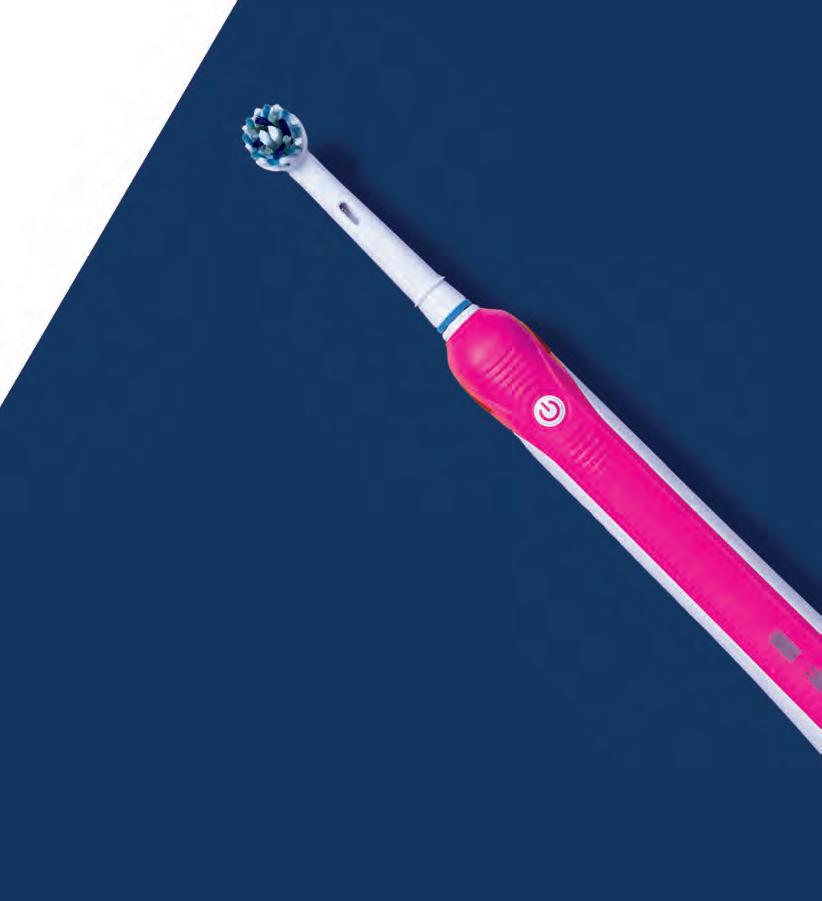
Benenden Health Cash Plan is offered by Benenden Wellbeing Limited, an insurance intermediary, which is authorised and regulated by the Financial Conduct Authority (Financial Services Register number 593286). Registered in England and Wales (company no. 8271017). Benenden Wellbeing Limited is a wholly owned subsidiary of The Benenden Healthcare Society Limited. The Registered Office of both: Holgate Park Drive, York, YO26 4GG. Benenden Health is a trading name of The Benenden Healthcare Society Limited.
Benenden Health Cash Plan cover is issued and administered by BHSF Limited. BHSF Limited is authorised by the Prudential Regulation Authority and regulated by the Financial Conduct Authority and Prudential Regulation Authority (202038). Registered in England and Wales (company number 35500).
Registered office: 13th Floor, 54 Hagley Road, Birmingham, B16 8PE.

PublishedfortheBenenden HealthcareSocietybyThink. Thismagazineisalsoavailable inBraille,largeprintandon audioCD.
BenendenHealth HolgateParkDrive, YorkYO264GG
Telephone08004148100* benenden.co.uk
Editor SarahNotton behealthy@benenden.co.uk
Contributingeditors DawnHarper, MatthewRock Groupartdirector MatthewBall
Designer JohnPender Groupmanagingeditor SianCampbell Managingeditor AndrewLittlefield Advertisingsales ElizabethCourtney elizabeth.courtney@ thinkpublishing.co.uk 02037717208 Executivedirector JohnInnes john.innes@thinkpublishing. co.uk
ProducedforBenenden HealthbyThink 20MortimerStreet, LondonW1T3JW Telephone02037717200 thinkpublishing.co.uk
©BenendenHealthcare Society.Reproductionin wholeorpartwithout writtenpermissionisstrictly prohibited.Theviews expressedinthismagazine arenotnecessarilythose ofBenendenHealth.All advertisingisacceptedingood faithandnoendorsement shouldbeinferred;neither shouldthepresenceofany BenendenHealthbusiness’s logoinapromotion(aspart ofacommercialarrangement withaselectedpartner)be construedasanendorsement. Pleasecheckanymedical ordietaryadvicewithyour owndoctor.
Circulation 357,302ABC(Jan-Dec2019)
*Pleasenote,callsmaybe recordedforourmutual securityandalsofortraining andqualitypurposes.
Hasyour Benenden Health membership givenyou access to diagnostics/ treatment/support that otherwise you would’ve had a long wait for? We’d love to hearfromyou so we can shareyour experience with members and non-members. Email us at behealthy@benenden.co.uk
I found the article ‘A vital service’ in issue 60 extremely thoughtprovoking, particularly the reference to Blue Monday. From what I have since read on the internet, it is apparently the most depressing day of the year and falls on the third Monday in January.
A close family member is due to start an intensive course of cancer treatment around that time. Reading the article has made me resolved to turn those precious 24 hours into as joyful, positive and fulfilling a time as I possibly can.
Chris CAs a volunteer with the British Red Cross, I was hugely pleased to see the Benenden Health donation to the Disasters Emergency Committee
How worrying to read in Dr Max Pemberton’s Backchat article
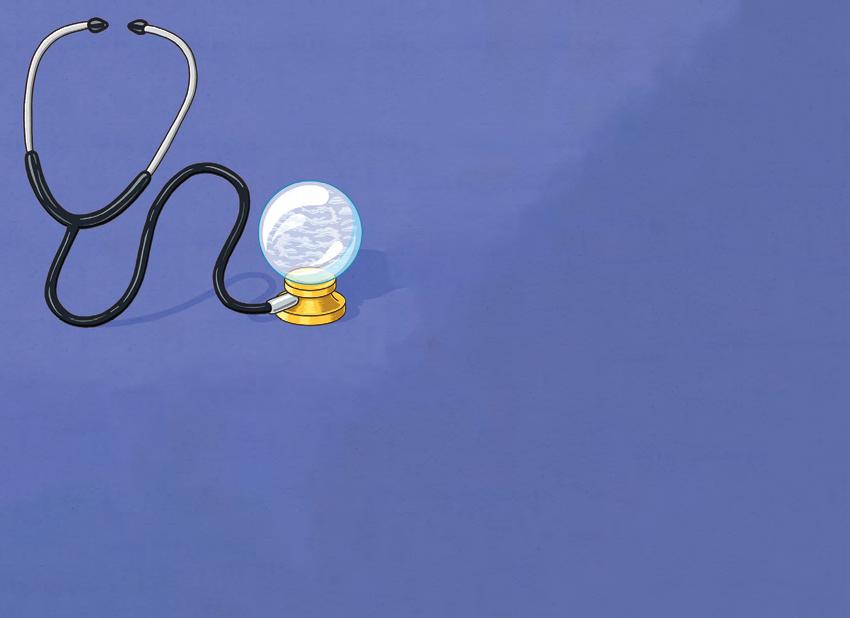
[Be Healthy, issue 61] that uptake of health screening is at an all-time low in the UK. I went for a routine mammogram in March 2022 and a cancerous tumour far too small and too deep to be manually felt was discovered. I looked and felt completely well. Now, following two operations and a week’s worth of radiotherapy, I thank my lucky stars that I attended that mammogram appointment. Screening procedures can be uncomfortable and do disrupt your routine, but I would urge everyone not to miss them. I suspect mine may have saved my life.
Kate Howardappeal announced in issue 60, but wonder if Benenden Health members are aware of the considerable input by Red Cross volunteers within the UK.
Apart from emergency support to those residents affected by the many summer house fires, British Red Cross volunteers have greeted many refugees arriving from Ukraine at UK airports with offers of immediate assistance in collaboration with local authorities, particularly where accommodation was required.
Thanks to reader Clive Haste who pointed out that our Shepherd’s Pie recipe on p8 of issue 61 should be made with lamb mince. It is considered a cottage pie if made with beef mince.
Shareyour experienceonlineat uk.trustpilot.com/ review/benenden. co.ukorscanthe QRcodeabove

Other volunteers have been instrumental in assisting with the despatch of mobile sim cards to those whose phones require a UK network provider for them to register with the authorities here; other volunteers stand ready to offer psychological telephone support as required.
Derek WilliamsTheseletterswere receivedinresponseto theautumnandwinter 2022issues.Sometimes lettersoremailshavetobe editedtofitonthepage. Togetintouchaboutthis issueofBeHealthy,please emailbehealthy@ benenden.co.ukorwriteto usatBeHealthy,Benenden Health,HolgatePark Drive,YorkYO264GG.
Ourstarletterischosen bythemagazine’s editorialteam.Nocash alternativesareavailable.
Thewriterofthestar letterwillreceive a£25M&Svoucher.


CBD is big business. In 2021, the UK CBD industry was estimated to have generated £690m in sales, and it is expected to be worth almost £1bn by 2025. CBD comes in many forms, including oils, extracts, capsules, patches and creams. It’s added to drinks, foods and vapes. There are even CBD dog treats. Its advocates claim it offers a host of health benefits and the list of conditions it is alleged to help is dizzyingly long.
ILLUSTRATION:PHILHACKETTSome are concerned that something derived from cannabis is becoming so popular. CBD is short for cannabidiol, one of the compounds in the cannabinoid family which, in nature, is found only in the cannabis plant. However, it’s the tetrahydrocannabinol, or THC, not the CBD that produces the ‘high’ people get from smoking cannabis so CBD is not thought to be addictive in the way that THC is, making concerns about it being abused largely unfounded.
Part of the problem with evaluating how useful CBD can be is that there are very few good, properly conducted scientific studies. Being derived from cannabis has brought with it considerable legal restrictions until recently. However, medicine has known about some of the positive benefits of CBD for some time. CBD has been shown to be very effective in reducing seizures in some rare forms of childhood epilepsy, so much so that a drug called Epidyolex has been developed and is available on prescription. There have been some small studies in psychiatry – with CBD showing some promise for use in anxiety, psychosis and addictions. Other studies have suggested it can help in chronic pain and insomnia.
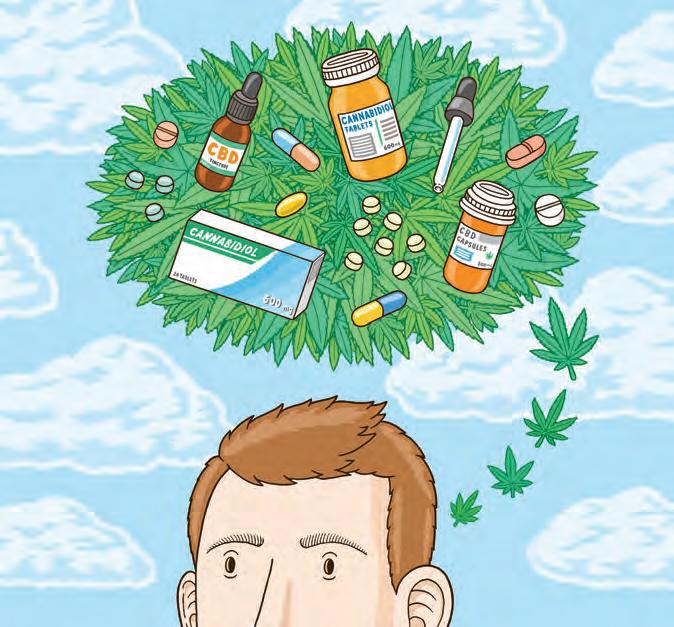
However, despite what those championing it might claim, the unfortunate truth is that the research is far from conclusive. Some studies have suggested that CBD is quite difficult for the body to absorb, meaning that for a clinical benefit, patients would need to take higher doses than those commonly available. Another problem is that products are not manufactured, monitored or controlled in the same way medicines are, so they could be contaminated, and the user can’t guarantee the quality or even the dose of the CBD they are taking.
Then there are the potential side effects, such as vomiting, diarrhoea and sedation. Because CBD is broken down in the liver, it can also interact with prescribed medications and increase the levels of these in the blood. It’s certainly not an inert substance and for this reason most researchers and doctors caution against people self-medicating with it.
There’s no doubt that CBD is an interesting compound and I suspect that as we conduct more research into it and understand how it works in the body, we’ll realise it has important medical uses. But until then, I’d think carefully before spending your hard-earned money on it.
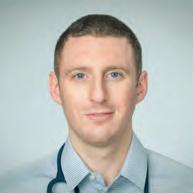
Ithasbeenhailed asapanaceafora hostofmedical complaintsfrom anxietytoarthritis, PTSDtochronic pain.ButisCBD–acompound derivedfrom cannabis–allit’s crackeduptobe?
‘Theunfortunate truthisthatthe researchisfar fromconclusive’





Ever thought it might be time to check-in on your family's health? Whether it's your partner, parent, children or grandchildren, Benenden Health provides private healthcare for everybody, it's a great time to add them to your membership.
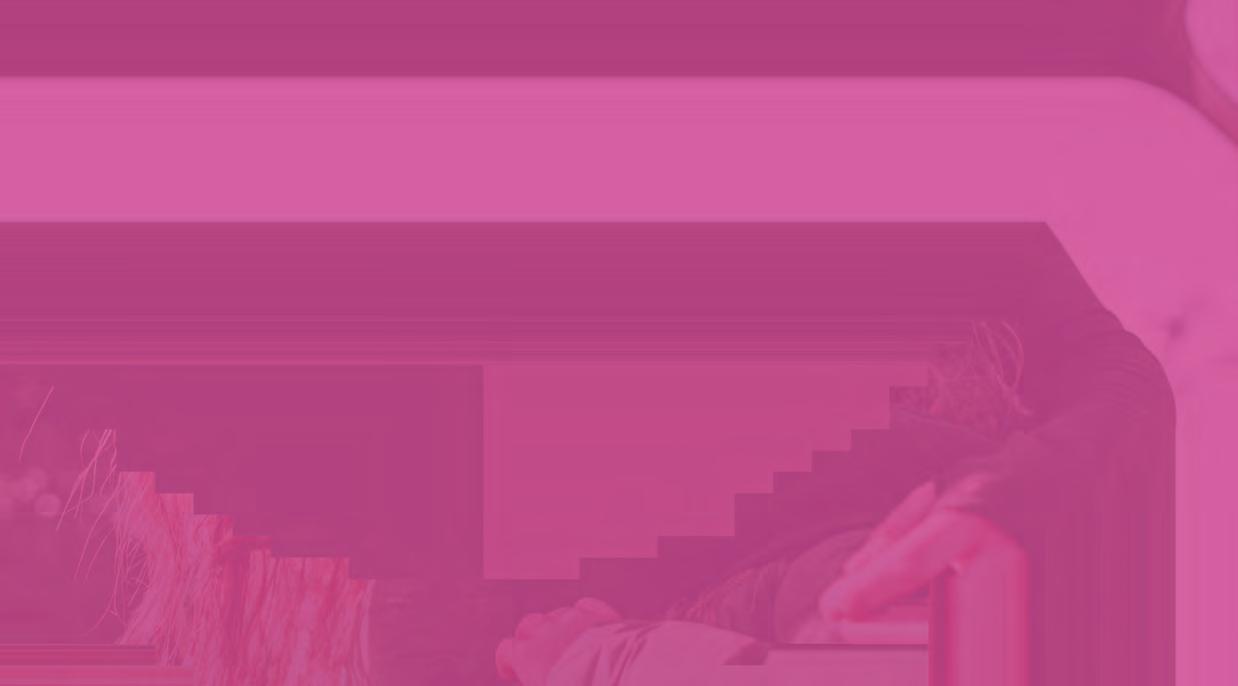




It's time to stop being so British about our health, and open up about our worries, troubles, aches and pains. With Benenden Health it couldn't be simpler for you and your loved ones to put your health first. For just £11.90* per person, per month, you can add someone to your membership so they can access round the clock services like our 24/7 GP and Mental Health helplines. * From 1st April 2023, the cost of membership will increase by 90p from £11.90 to £12.80 per person, per month or £153.60 if paying annually.
Benenden Health is a trading name of The Benenden Healthcare Society Limited, which is an incorporated Friendly Society, registered under the Friendly Societies Act 1992, registered number 480F. The Society's contractual business (the provision of tuberculosis benefit) is authorised by the Prudential Regulation Authority and regulated by the Financial Conduct Authority and the Prudential Regulation Authority, FRN 205351. Verify our registration at register.fca.org.uk. The remainder of the Society's business is undertaken on a discretionary basis. The Society is subject to Prudential Regulation Authority requirements for prudential management. No personal recommendation has been given. If in doubt as to the suitability of this product, you should seek independent advice. Registered Office: The Benenden Healthcare Society Limited, Holgate Park Drive, York, YO26 4GG.
Get moving again with fast access to our self-pay hip and knee treatments. We offer a clean, infection-free environment, modern, ensuite private rooms and a rapid recovery programme which can get you back on your feet faster. Choose the leading provider of hip and knee treatments in Kent and Sussex.* For members living outside of Kent and Sussex, there are five additional hospitals to choose from. Details of member discounts can be viewed on benenden.co.uk/selfpay



